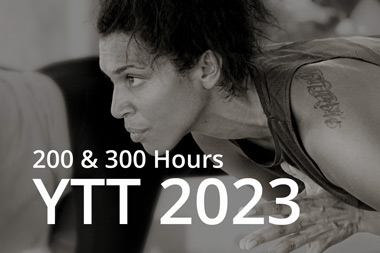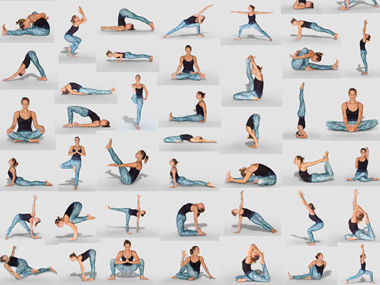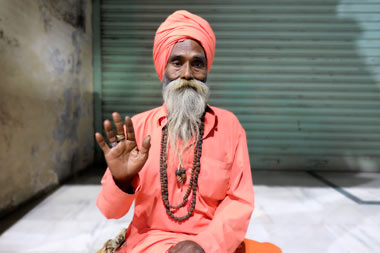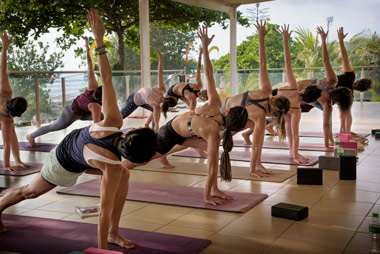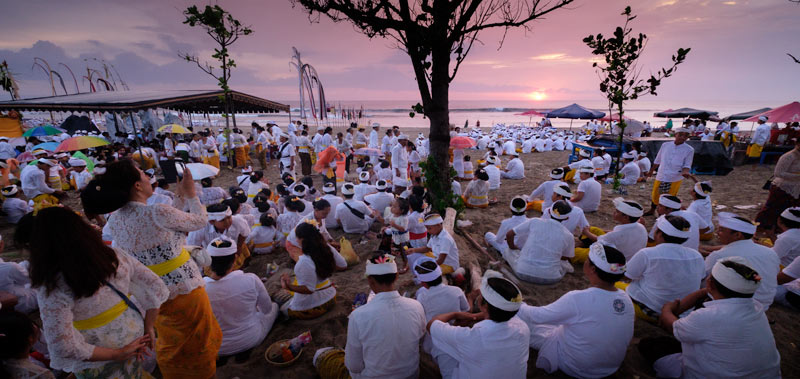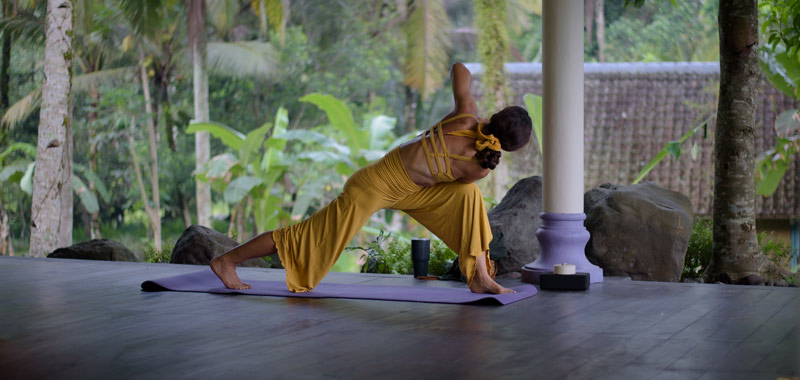Yoga Poses GuideExplore 78 Asanas with Benefits, Keys, and Sanskrit Names
Our Yoga Poses Guide gathers 78 Asanas, providing a quick overview of their keys, benefits, cautions, qualities, and Sanskrit names. Originally designed as a pedagogical tool for our Yoga teacher training students, it has become an essential resource for trainers and practitioners seeking a comprehensive understanding of each Asana.
Pose Types
Pose Levels
Pose Benefits
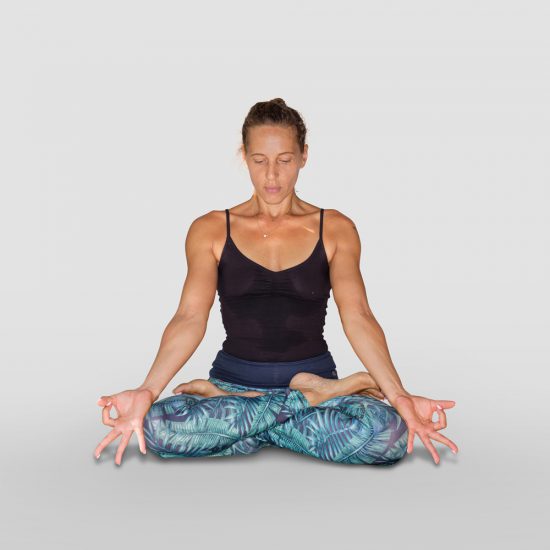
Lotus Pose
Sanskrit Name: Padmasana
seated pose, intermediate, calmingBenefit:
Lotus Pose is great for meditation and Pranayama practice. Much more stable than its counterparts. This asana allows the entire body to remain steady during a long period of time. Hip Opening, Relaxing, Improving Posture.
Keys:
Feet on the top of thighs, Spine elongate, mind the knees, and relax the shoulders. Top of the head toward the ceiling and chin slightly down. A great mobility in the hips are required before mastering the pose.
Cautions:
Any pain or injuries in the knees, ankles or calves.
Level:
intermediate
Type:
seated pose
Quality:
calming
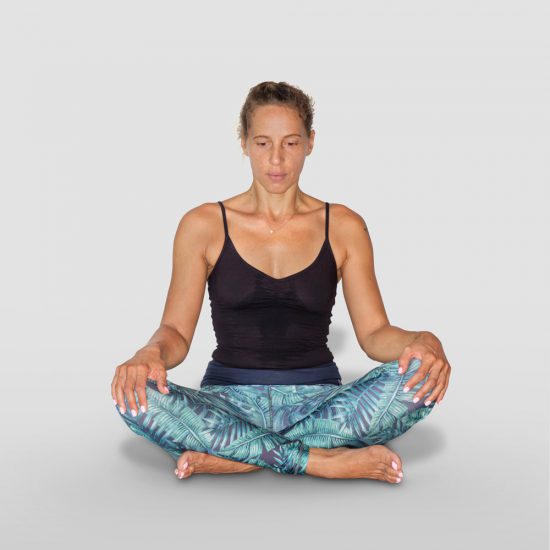
Easy Pose
Sanskrit Name: Sukhasana
seated pose, beginner, calmingBenefit:
Easy Pose greatly improves the hip joints rotation, strengthen the legs and the upper back and the shoulders. Calm the mind, excellent for centering. Main: Hip Opener, straighten Back, Calmness.
Keys:
Mind the sit bones, lengthen the spine, shoulders relaxed, chin slightly down, back of the neck elongate. If there is discomfort in the knees, allow to keep the knees slightly up or sit on a block.
Cautions:
Knee or ankle injuries, sciatica.
Level:
beginner
Type:
seated pose
Quality:
calming
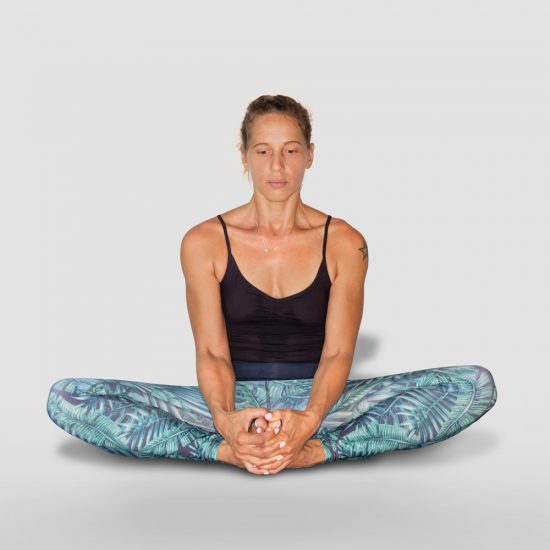
Bound Angle Pose
Sanskrit Name: Baddha Konasana
seated pose, beginner, groundingBenefit:
Bound Angle Pose improves hips and ankles flexibility, tones the leg muscles and strengthen the back. Stretches the groin and the inner legs. Main: Hip Opener ++, Back Strength, Leg Flexibility.
Keys:
Press the sole of the feet together, mind the sitting bones and the inner thighs, lengthen the spine, relax the shoulders. If there is discomfort in the knees, allow to keep the knees slightly up or sit on a block.
Cautions:
Ankle, knees, groin hips injuries or inflammation.
Level:
beginner
Type:
seated pose
Quality:
grounding
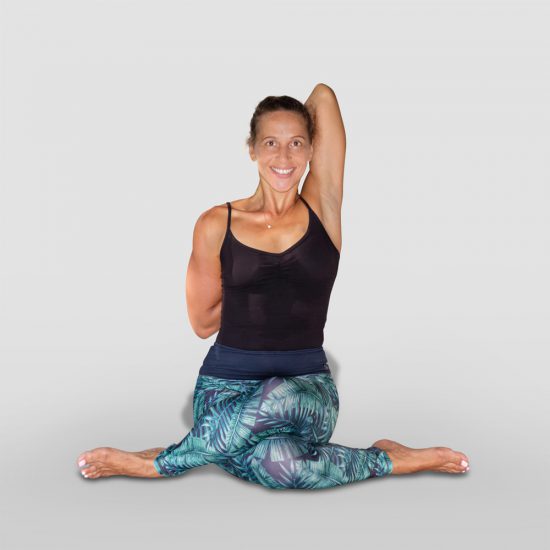
Cow Face Pose
Sanskrit Name: Gomukhasana
seated pose, intermediate, groundingBenefit:
Cow Face Pose greatly improves hips, quadriceps, shoulders flexibility and tones the abdominal organs. Relieve tiredness, sciatica, cramps in the legs. Excellent for relaxation. Main: Chest Opening, hip, quadriceps, shoulder, triceps and abdomen Stretching.
Keys:
Hips between the feet, knees in the same line, spine elongate, chest open, elbows in line with the shoulders. Keep the lower leg straight if there is any discomfort in the knees.
Cautions:
Wrist, elbows, shoulders, neck hips or quads injuries.
Level:
intermediate
Type:
seated pose
Quality:
grounding
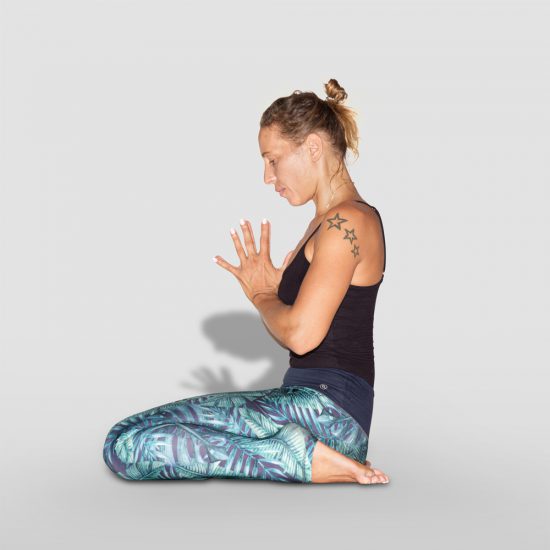
Hero Pose
Sanskrit Name: Virasana
seated pose, beginner, calmingBenefit:
Hero Pose creates an intense stretch of the quadriceps and ankles. Posed for practicing pranayama and meditation, improve the circulation in the legs and calm the mind. Main: Relaxing, Rejuvenating knees, Posture improving.
Keys:
Sit between the feet, Elongated the Spine, shoulders back and relax, Mind the knees. Keep on leg extend if you feel discomfort in the knee or sit on the block between your feet.
Cautions:
Knees or ankle injuries.
Level:
beginner
Type:
seated pose
Quality:
calming
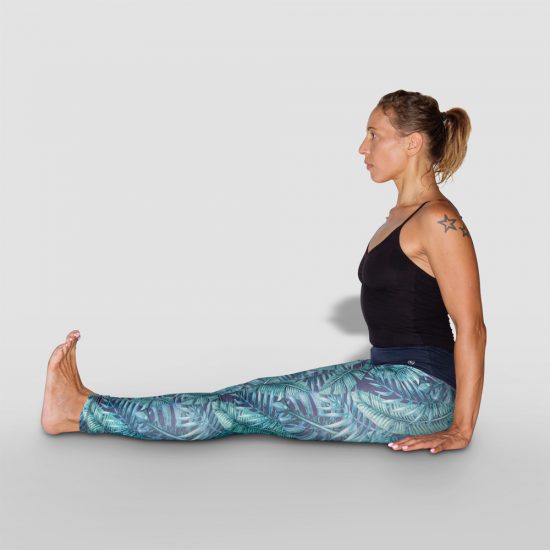
Staff Pose
Sanskrit Name: Dandasana
seated pose, beginner, groundingBenefit:
Staff Pose strengthen the spine and the abdominal muscles. Dandasana is the foundation of most of the seated asana. Main: Hamstring, Calves and Hips Stretching. Allows complete body awareness.
Keys:
Feet flex, sitting bones press on the floor, legs engaged, lengthen the spine, shoulders down and relaxed.
Cautions:
Lower back injuries, sciatica.
Level:
beginner
Type:
seated pose
Quality:
grounding
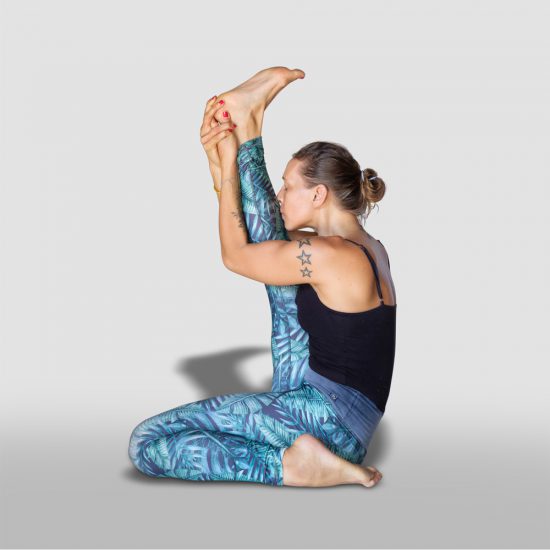
Heron Pose
Sanskrit Name: Krounchasana
seated pose, intermediate, calmingBenefit:
Heron Pose stretches the ankles, calves, hamstrings, quadriceps, spine and shoulders and stimulate the abdominal organs. Main: Core Flexibility, Hip and Legs Strength.
Keys:
Both hips on the floor, Extended leg and arms engage, Spine lengthen. Mind the knee.
Cautions:
Sciatica, ankles, knee or hips injuries.
Level:
intermediate
Type:
seated pose
Quality:
calming
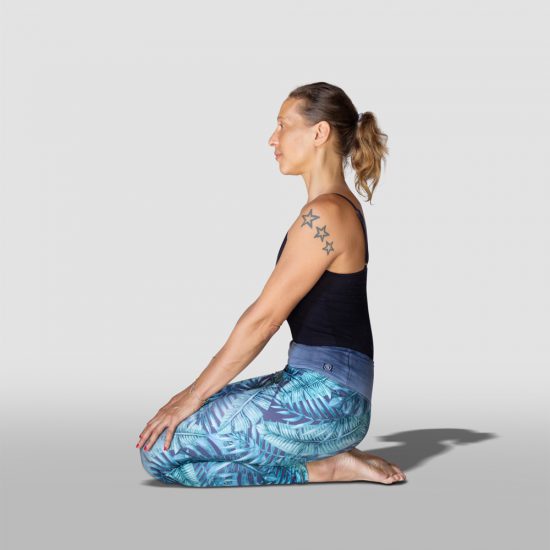
Diamond Pose
Sanskrit Name: Vajrasana
seated pose, beginner, calmingBenefit:
Diamond Pose increase entire digestive system efficiency, strengthen pelvic muscles, alleviate menstrual disorders, hernia prevention. Main: Ankles, knees, quads muscles stretch.
Keys:
Big toes together, heels touching the side of the hips, spine in long, palms on or above the knees. Do not over twist the ankles, mind the knees, don't arch the lower back.
Cautions:
Knees or ankle injuries.
Level:
beginner
Type:
seated pose
Quality:
calming
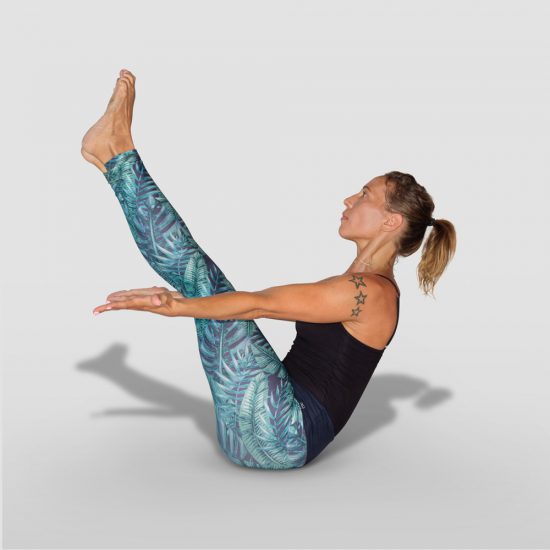
Boat Pose
Sanskrit Name: Navasana
seated pose, intermediate, energizingBenefit:
Boat Pose creates cores, back, hip flexor strengthening, hamstring stretching and tones abdominal organs. Also improve balance and confidence.
Keys:
Core engaged, inner thigh squeezed, shoulder out, chest open, back straight, crown toward the ceiling. Mind the neck and the lower back.
Cautions:
Mind the neck and the lower back.
Level:
intermediate
Type:
seated pose
Quality:
energizing
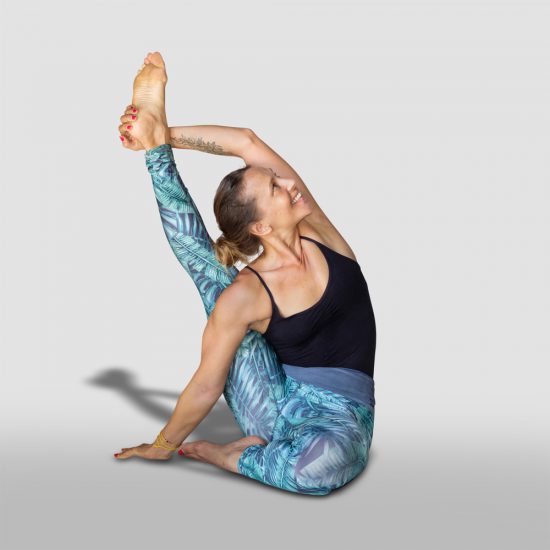
Compass Pose
Sanskrit Name: Surya Yantrasana
seated pose, intermediate, energizingBenefit:
Compass Pose stretches the calves hamstrings and psoas, improves shoulder and hip flexibility, tones the arms, spine and abdominal organs. Also improves spine health and digestion.
Keys:
Press firmly the palm on the floor to activate the bottom arm, let the hip open and extend the leg up till the tip toes, open the chest to the opposite direction.
Cautions:
Mind the shoulders, wrists and the elbow of the bottom arm.
Level:
intermediate
Type:
seated pose
Quality:
energizing
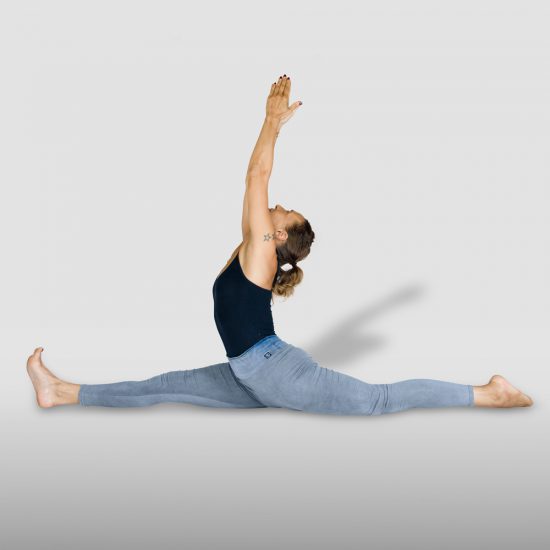
Monkey pose
Sanskrit Name: Hanumanasana
seated pose, advanced, groundingBenefit:
Monkey pose improves balance, stability and flexibility of the hips and pelvic girdle. Tones, stretches and strengthens the leg muscles. Enhance the feeling of grounding and balance the nervous system.
Keys:
The shoulders and neck should be relaxed, and the body weight centered.
Cautions:
Injury of the tailbone, hips, pelvis, knee or ankle. Pregnancy.
Level:
advanced
Type:
seated pose
Quality:
grounding
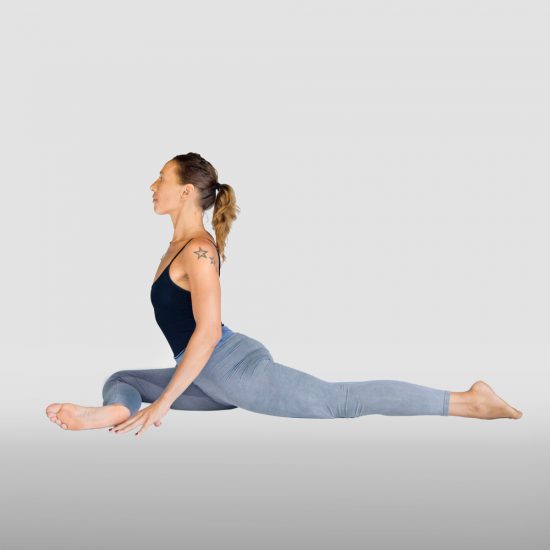
Half Pigeon Pose
Sanskrit Name: Ardha Kapotasana
seated pose, intermediate, groundingBenefit:
Half Pigeon Pose improves the hips opening and the flexibility of the spine. Strengthens the core and back muscles. Relieves fatigue and calms the mind.
Keys:
The hips should be on the same level, the spine not twisted, chest facing forward, try to not lean to the side.
Cautions:
Ankles, hips, back, or knees injuries.
Level:
intermediate
Type:
seated pose
Quality:
grounding
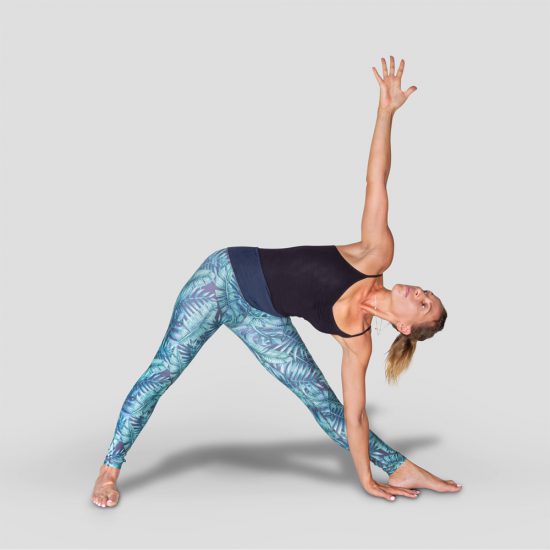
Triangle Pose
Sanskrit Name: Utthita Trikonasana
standing pose, beginner, energizingBenefit:
Triangle Pose greatly improves hip joints rotation. Strengthen legs, upper back and shoulders. Also improve the digestion and tones the reproductive organs. Main: Hip, shoulder, side of the trunk, waist and abdominal muscle stretch.
Keys:
Feet press, Bend from the hips, Spine long, Keep the chest opened and lifted up, Mind the neck, look to the side if you feel discomfort when you look up.
Cautions:
Knees, hamstring, hips, back or neck injuries.
Level:
beginner
Type:
standing pose
Quality:
energizing
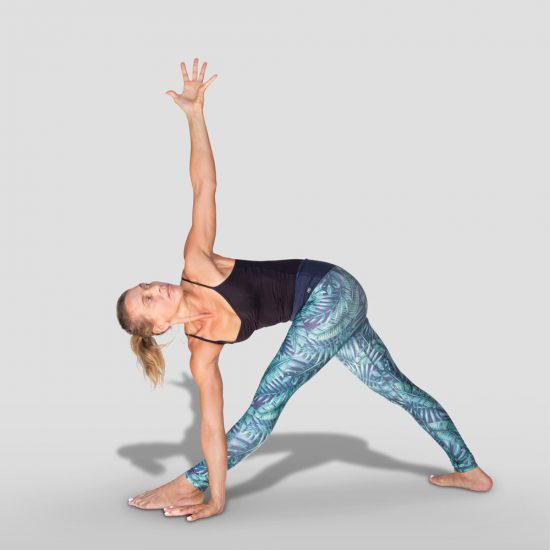
Revolved Triangle Pose
Sanskrit Name: Parivrtta Trikonasana
standing pose, intermediate, energizingBenefit:
Revolved Triangle Pose stretches hamstrings, calves, side abdominal and shoulders. Massages the abdominal organs. Main: Legs, upper back and shoulders Strengthening, Balance.
Keys:
Foot press, Legs active, Hips on the same level, Spine elongated, Chest and shoulders open. Mind the back leg, keep it engage.
Cautions:
Knees, hips, spine, shoulders or neck injuries. Migraines or hypertension.
Level:
intermediate
Type:
standing pose
Quality:
energizing
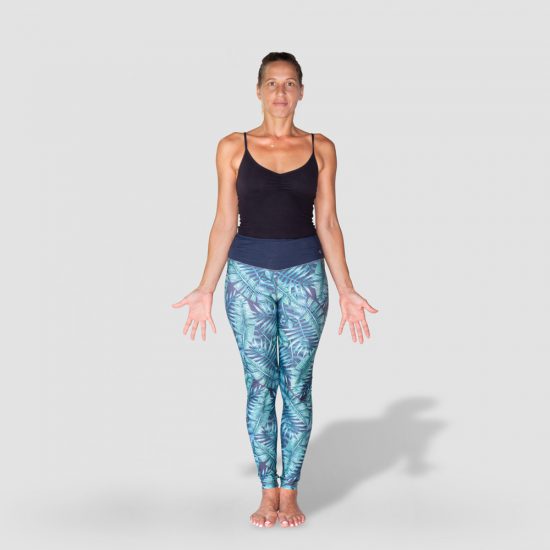
Mountain Pose
Sanskrit Name: Tadasana/Samasthiti
standing pose, beginner, groundingBenefit:
Mountain Pose improves the posture and the body awareness. Strengthens the core muscles. Tadasana is the foundation of most of the standing asana. Main: Calmness, Centering, Grounding.
Keys:
Feet press, Legs engaged, Elongates the spine, top of the head toward the ceiling, Shoulders down and relaxed, palm facing forward. Breath lengthen.
Cautions:
Falls are not uncommon when trying to practice Tadasana with eyes closed.
Level:
beginner
Type:
standing pose
Quality:
grounding
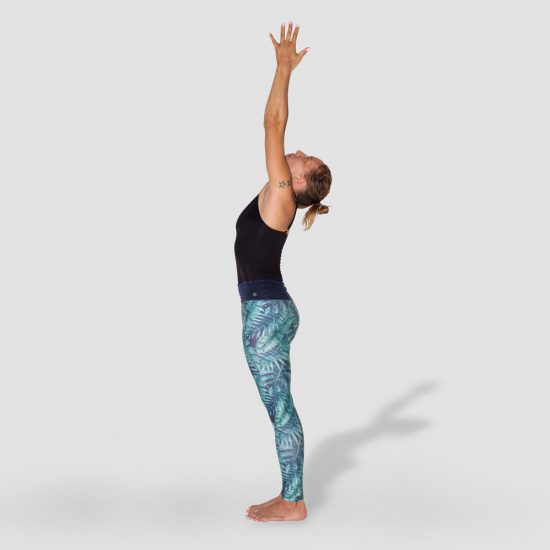
Upward Salute
Sanskrit Name: Urdhva Hastasana
standing pose, beginner, energizingBenefit:
Upward Salute improves the posture, stretches the abdomen and tone the nerves and muscles. Main: Elongates the spine, improves the digestion and the confidence.
Keys:
Feet the press, Legs engaged, Spine Elongated, Arms along the ears.
Cautions:
Blood pressure, neck and shoulders injuries.
Level:
beginner
Type:
standing pose
Quality:
energizing
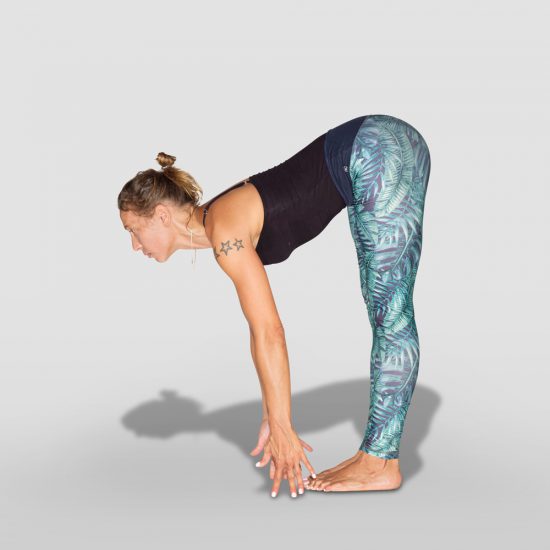
Half Standing Forward Bend
Sanskrit Name: Ardha Uttanasana
standing pose, beginner, energizingBenefit:
Half Standing Forward Bend corrects hyper kyphosis and tones abdominal muscles. Use as a transition pose during the flow. Main: chest opening, strengthen the back, hamstring stretch.
Keys:
Feet press, Legs active, back straight and elongated, tailbone upward, mind the neck compression.
Cautions:
Blood pressure, lower back injuries.
Level:
beginner
Type:
standing pose
Quality:
energizing
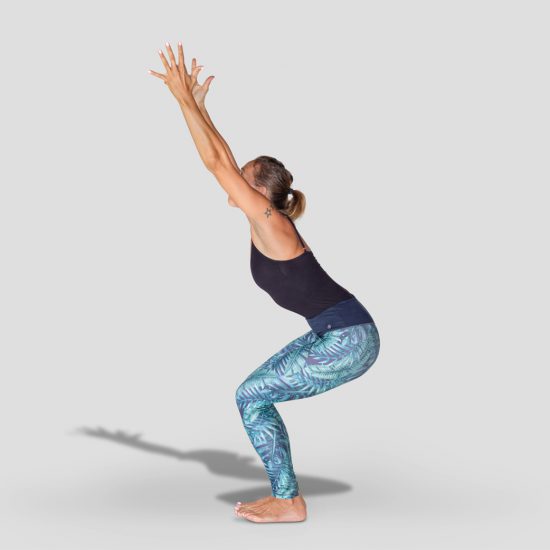
Chair Pose
Sanskrit Name: Utkatasana
standing pose, beginner, energizingBenefit:
Chair Pose improves posture, tones the nervous system. Reinforce the legs, gluts and abdominal muscles. Stimulates the heart and diaphragm. Main: Overall body stretch/strengthening, energizing.
Keys:
Feet press, knees above heels, tail bone tucked in, arms along the ears, palms together in the full pose.
Cautions:
Ankles, knee or back injury. Arthritis, low blood pressure.
Level:
beginner
Type:
standing pose
Quality:
energizing
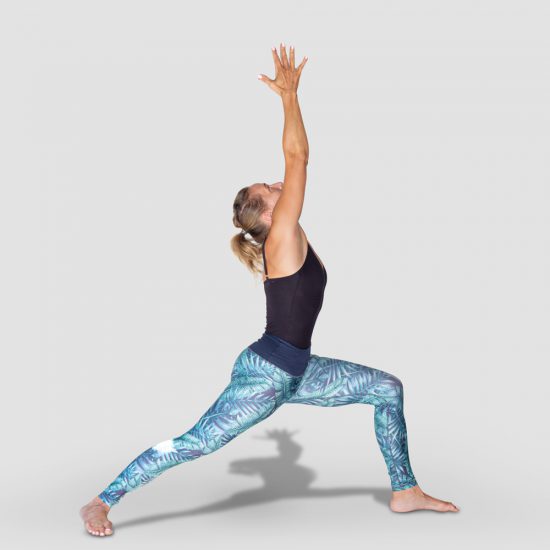
Warrior 1
Sanskrit Name: Virabhadrasana I
standing pose, beginner, energizingBenefit:
Warrior 1 improve the rotation of the hips and mobilize the spine. This pose offers a full body stretch and strengthening and improves breathing and circulation.
Keys:
Front knee above heel, Hips facing forward, tail bone tucked in, Legs and core engaged, Chest open and lifted up. Back foot firmly press. Main: Chest Opening, Grounding and Improves Confidence.
Cautions:
Knee or hip injuries, blood pressure or difficulty to balance.
Level:
beginner
Type:
standing pose
Quality:
energizing
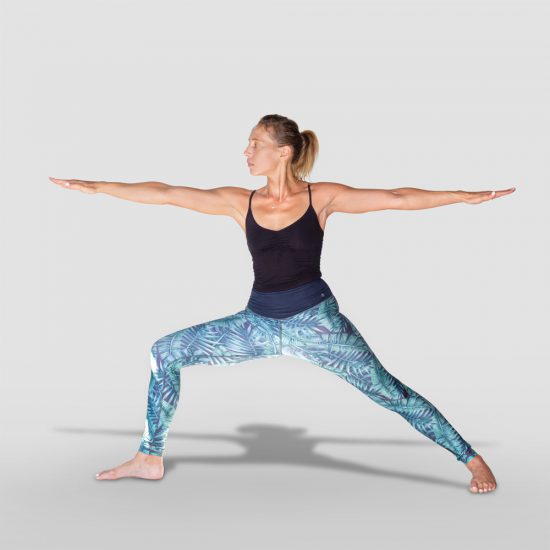
Warrior 2
Sanskrit Name: Virabhadrasana II
standing pose, beginner, groundingBenefit:
Warrior 2 strengthens the legs, shoulders, back and chest muscles. Open the rib cage, invigorate the nervous system, improve hips joint movement. This asana provides a great feeling of grounding and confidence. Main: Hips opener, overall body strength, respiration/circulation.
Keys:
Front knee above the heel, hips facing to the side, tail bone tuck in, arms in a line, shoulders above the hips.
Cautions:
Sacroiliac injury or inflammation. Ankle, knee or hips injuries.
Level:
beginner
Type:
standing pose
Quality:
grounding
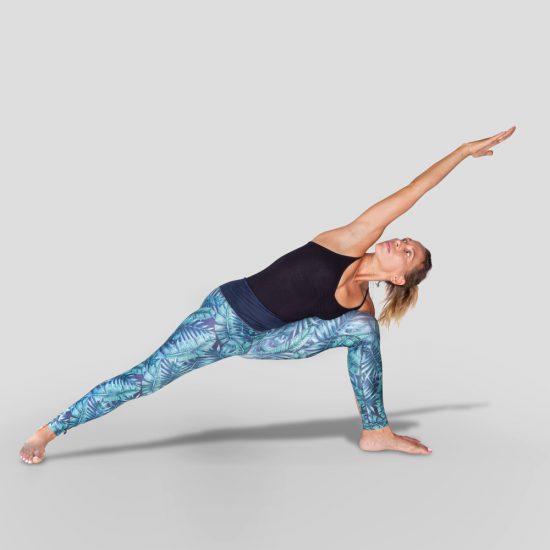
Extended Side Angle Pose
Sanskrit Name: Utthita Parsvakonasana
standing pose, beginner, energizingBenefit:
Extended Side Angle Pose stretches side abdominal muscles and strengthen the legs, shoulders, wrists and ankles. Main: Overall stretch the full body, develops stamina.
Keys:
Feet press, Front knee directly above ankle, chest open, back-foot ankle, hip and wrist in line, mind the neck, shoulders away from the ear. Keep the back leg engage.
Cautions:
Ankles, hips, shoulders or neck injuries.
Level:
beginner
Type:
standing pose
Quality:
energizing
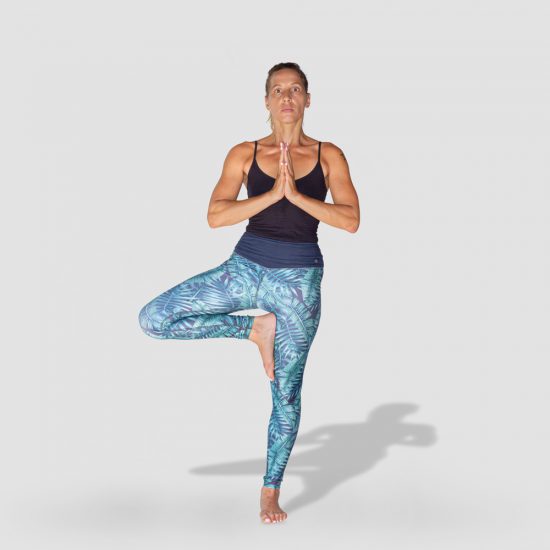
Tree Pose
Sanskrit Name: Vrksasana
standing pose, beginner, groundingBenefit:
Tree Pose helps center yourself and build focus. Calm the mind, improve balance and strengthens the supporting leg.
Keys:
Floor foot and leg engaged, Hips facing forward, Foot pressed onto inner the thigh, Spine elongated. Never press the sole of the feet onto the knee, lower down to the calf if you cannot reach the inner thigh. Main: Balance, Concentration, Hip Opener.
Cautions:
Any ankle, knee or hips injuries.
Level:
beginner
Type:
standing pose
Quality:
grounding
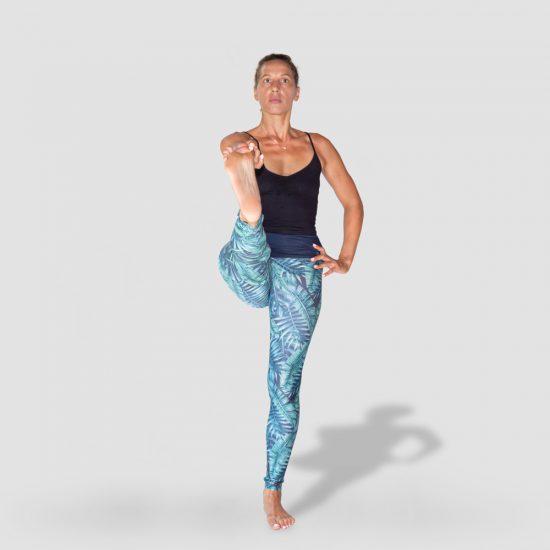
Extended Hand To Big Toe A
Sanskrit Name: Utthita Hasta Padangusthasana A
standing pose, intermediate, balancingBenefit:
Extended Hand To Big Toe A stretches and brings flexibility to the hips and the hamstrings, strengthens legs and ankles. Promote confidence and improves the balance. Main: Balance, Focus, Legs Strength.
Keys:
Floor leg engaged, spine elongated, hips and shoulders on the same level, foot, hip, shoulder on the same line.
Cautions:
Knees, ankles or hips injuries.
Level:
intermediate
Type:
standing pose
Quality:
balancing
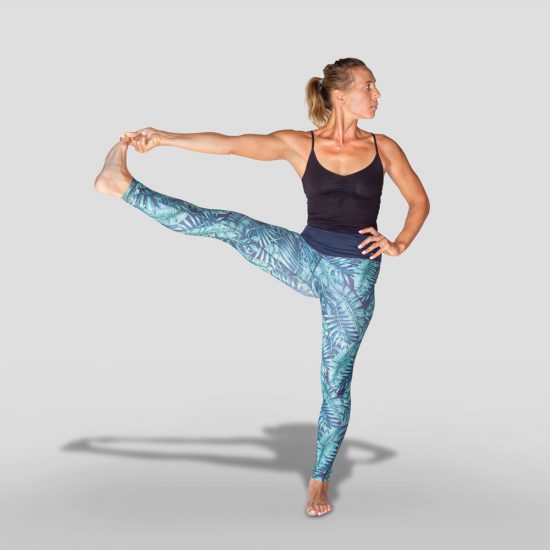
Extended Hand To Big Toe B
Sanskrit Name: Utthita Hasta Padangusthasana B
standing pose, intermediate, balancingBenefit:
Extended Hand To Big Toe B improves the confidence and concentration. Stretches and strengthens the legs. Promote balance. Main: Legs Stretching, hips opening, Balance.
Keys:
Floor leg engaged, spine elongated, hips and shoulders opened on the same level, feet, hip, shoulder in one line.
Cautions:
Knees, ankles or hips injuries.
Level:
intermediate
Type:
standing pose
Quality:
balancing
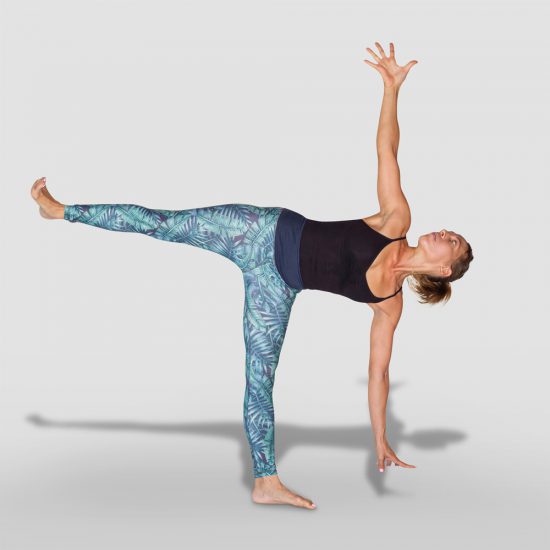
Half Moon Pose
Sanskrit Name: Ardha Chandrasana
standing pose, intermediate, balancingBenefit:
Half Moon Pose stretches the shoulders, spine, legs, and hips. Improve the balance. Main: Full body strengthening, balance, chest opener.
Keys:
Whole body engaged, Both hips above heel, Hips and chest open, Shoulder blades spread apart and arms in one line. Lighten the pose by lifting the trunk upward.
Cautions:
Sciatica, extreme low blood pressure, ankle, knee or hips injuries.
Level:
intermediate
Type:
standing pose
Quality:
balancing
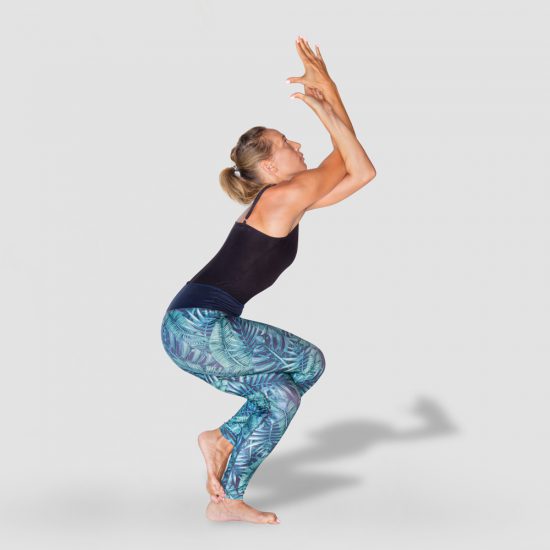
Eagle Pose
Sanskrit Name: Garudasana
standing pose, intermediate, balancingBenefit:
Eagle Pose improves the concentration, calm the mind, stimulate the blood circulation and the immune system. Main: Balance. Leg, wrist and ankle Strength. Shoulders and upper back stretch.
Keys:
Arms, legs and core engaged, Shoulder blades spread apart, Arms reaching up and elbow away from the chest. Allow to gently put the toes down if you cannot wrap the ankle around the leg.
Cautions:
Wrists, elbows, ankles, knees, shoulders and hips injuries.
Level:
intermediate
Type:
standing pose
Quality:
balancing
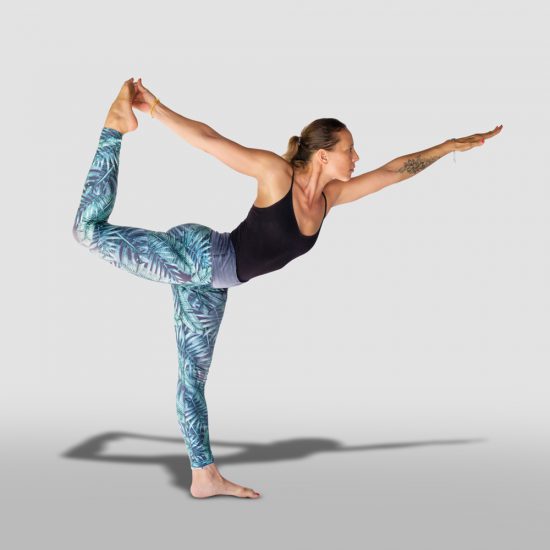
Lord Shiva's Pose
Sanskrit Name: Natarajasana
standing pose, intermediate, balancingBenefit:
Lord Shiva's Pose strengthen back, shoulders, arms, hips, and legs. Improve balance, concentration and confidence.
Keys:
Bottom leg straight, upper leg reaching back and up, chest facing forward, arms engage, focus gaze.
Cautions:
Ankle, shoulders and spine injuries. Avoid any lower back compression, keep the hips square.
Level:
intermediate
Type:
standing pose
Quality:
balancing
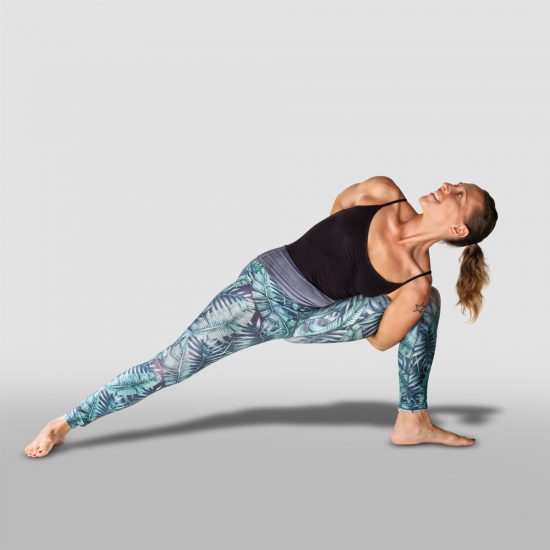
Bound Side Angle Pose
Sanskrit Name: Baddha Parsvakonasana
standing pose, intermediate, energizingBenefit:
Bound Side Angle Pose stretches and strengthens the entire body. Chest opener, tones the lower body. Helps in correcting hyperkyphosis.
Keys:
Feet press, legs engaged, shoulders and chest open, front knee above the heel, gaze up.
Cautions:
Mind the knees, hips and shoulders.
Level:
intermediate
Type:
standing pose
Quality:
energizing
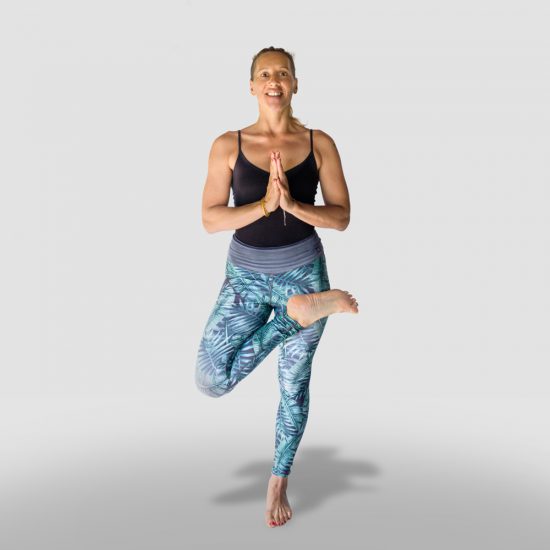
Half Lotus Tree Pose
Sanskrit Name: Ardha Padma Vrksasana
standing pose, intermediate, balancingBenefit:
Half Lotus Tree Pose improve blood circulation, stretches calves, hamstrings, increase ankle and hip flexibility. Improve the balance.
Keys:
Bottom leg straight, hips at the same level, long spine, bend knee toward the floor, inner thighs engage.
Cautions:
Knees, ankles and hip injuries.
Level:
intermediate
Type:
standing pose
Quality:
balancing
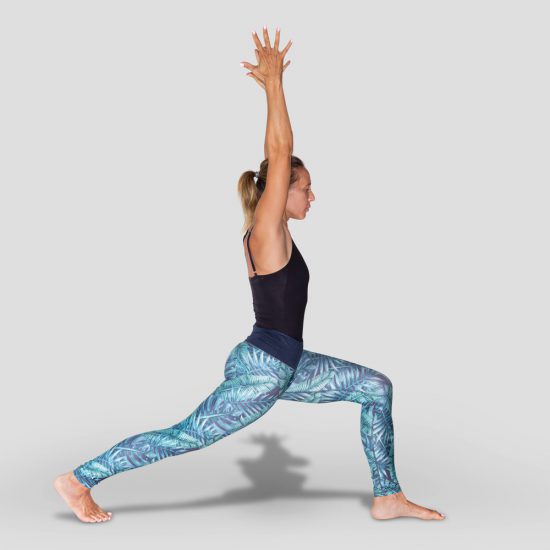
High Lunge Pose
Sanskrit Name: Utthita ashwa sanchalanasana
standing pose, beginner, balancingBenefit:
High Lunge Pose stretches and tones the entire body. Develops the stamina and confidence. Helps to improve the respiratory and circulatory system.
Keys:
The front knee should be directly above the ankle, the tailbone pointing down, the core and legs engaged, and the hips facing forward.
Cautions:
Knees, ankles or hips injuries.
Level:
beginner
Type:
standing pose
Quality:
balancing
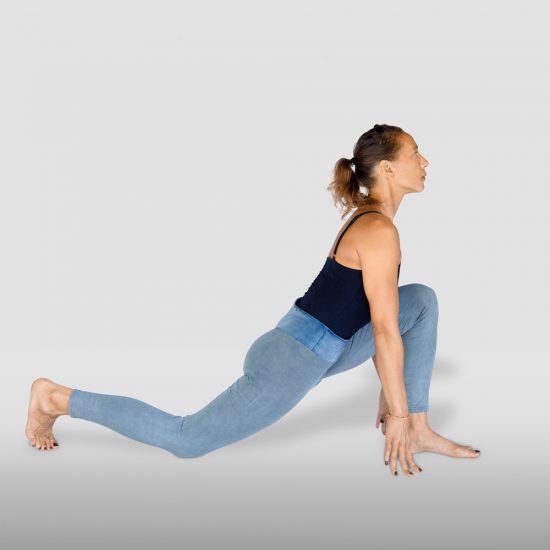
Equestrian Pose
Sanskrit Name: Ashwa Sanchalanasana
standing pose, beginner, energizingBenefit:
Equestrian Pose stretches your back muscles, quadriceps, legs, hips and groin. Improves the functioning of the liver and kidneys. Increases willpower and determination.
Keys:
The front knee should be directly above the ankle, the tailbone tucked in, the core and legs engaged, and the hips facing forward.
Cautions:
Knees, ankles or hips injuries.
Level:
beginner
Type:
standing pose
Quality:
energizing
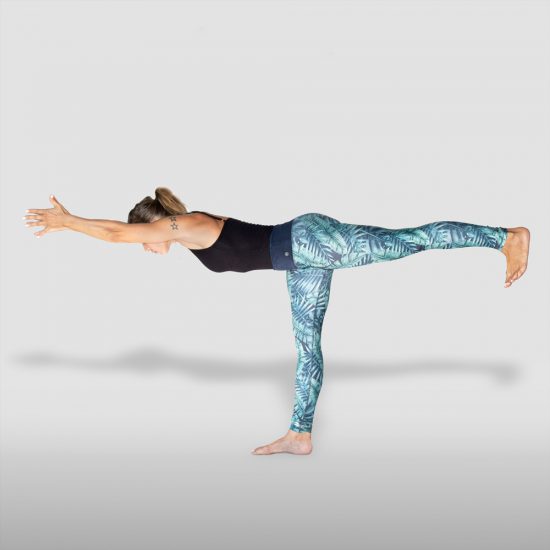
Warrior 3
Sanskrit Name: Virabhadrasana III
standing pose, intermediate, energizingBenefit:
Warrior 3 strengthen the groin, calves, thighs and ankles. Improves the posture and strength in the chest, arms and shoulders. Develops control, balance and focus.
Keys:
The lifted heel, hips, shoulders and ankle should all be aligned, and the hips on the same level.
Cautions:
Ankle or back injuries. High blood pressure or migraines.
Level:
intermediate
Type:
standing pose
Quality:
energizing
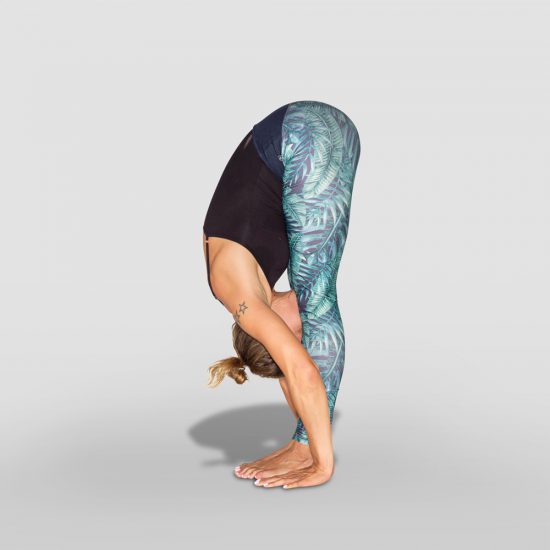
Standing Forward Pose
Sanskrit Name: Uttanasana
forward-bend, beginner, calmingBenefit:
Standing Forward Pose relieves stress, reduces fatigue and anxiety. Stretches the hamstrings, calves and hips while strengthening the thighs and the knees. Lengthens the spinal muscles. Calm the nervous system. Relaxation, Digestion, Stretching.
Keys:
Bend from the hips, tail bone upward, Keep the spine elongate, belly onto the thighs, face as close to the knees as comfortable. Allow to bend the knees if the spine rounds.
Cautions:
High blood pressure, disc herniation or hamstring tears.
Level:
beginner
Type:
forward-bend
Quality:
calming
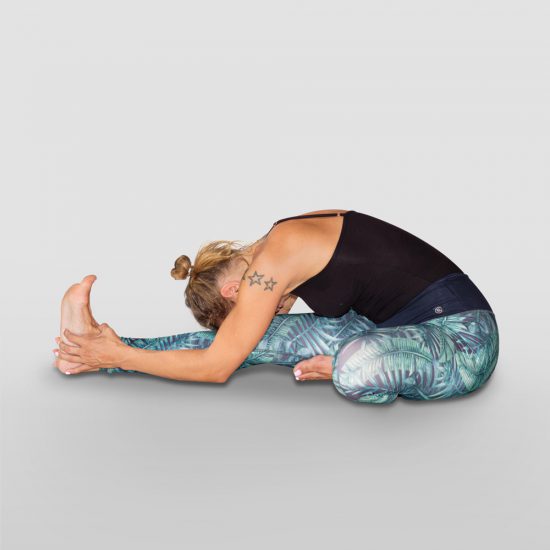
Head To Knee Pose
Sanskrit Name: Janu Sirsasana
forward-bend, intermediate, calmingBenefit:
Head To Knee Pose calm the brain, relieves anxiety and tiredness. Improve digestion. Softening up the legs as preparation for meditation asanas. Hamstring, calves, neck and Shoulder stretching, Spine lengthening.
Keys:
Active extended leg, Hips aligned, Spine elongate, belly onto the thigh, do not forceful to reach forward.
Cautions:
Sciatica, ankles, knee or hips injuries. IBS syndrome.
Level:
intermediate
Type:
forward-bend
Quality:
calming
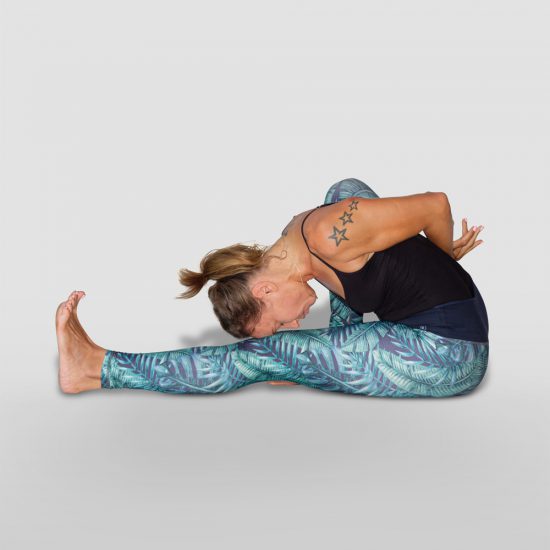
Sage Marichi 1
Sanskrit Name: Marichyasana I
forward-bend, intermediate, calmingBenefit:
Sage Marichi 1 tone the hips and abdomen, calm the mind, improves digestion and metabolism. Hamstrings, buttocks, shoulders, Hips and back Stretching, Chest opening.
Keys:
Front leg active and foot flex, Spine elongated, Arms wrapped around the bend leg, Head resting on knee.
Cautions:
Migraine, high blood pressure, ankle, hip, knee, shoulders or neck injuries.
Level:
intermediate
Type:
forward-bend
Quality:
calming
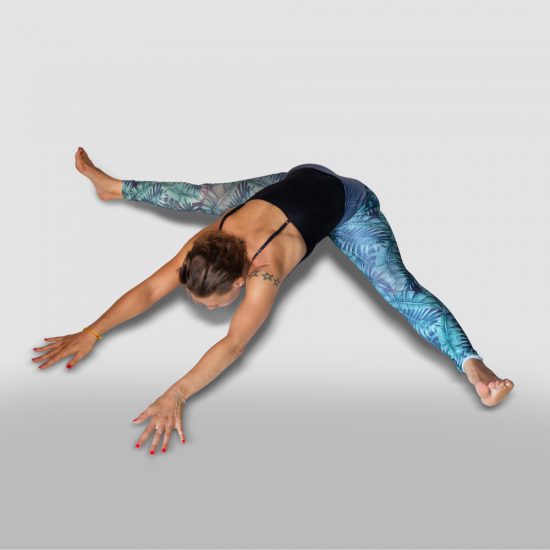
Wide Angle Seated Forward Bend
Sanskrit Name: Upavistha Konasana
forward-bend, advanced, calmingBenefit:
Wide Angle Seated Forward Bend Pose stretches the hip joints, inner tights, calves and hamstrings. Stimulates and detoxify the kidney. Also strengthens the spine.
Keys:
Legs pressing on the floor, thighs rolling inward, pelvic anterior tilt, spine long, crown reaching forward. Lower back problems, lack of flexibility sit higher up to maintain proper back alignment, do not open the legs to wild.
Cautions:
Knees, hips, hamstring, neck or lower back injury.
Level:
advanced
Type:
forward-bend
Quality:
calming
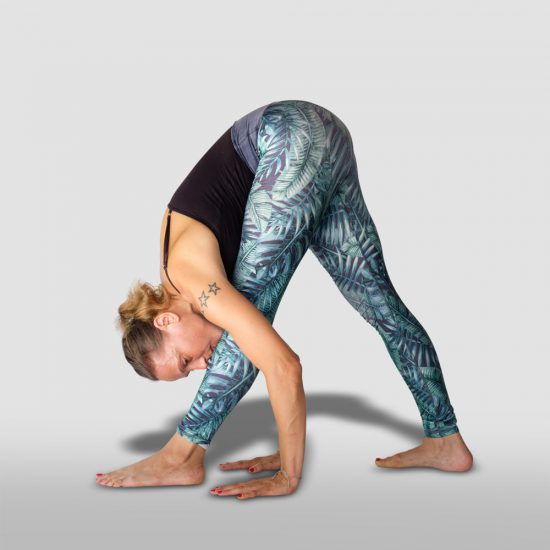
Pyramid Pose
Sanskrit Name: Parsvottanasana
forward-bend, intermediate, calmingBenefit:
Pyramid Pose develops stamina and deeply tones the legs. Improves the flexibility of the hamstrings, hips and spine. Relax the mind and bring balance in your everyday life.
Keys:
Hips at the same level, foots pressing firmly on the floor, legs active, long spine, crown toward the front foot. Do not strain the shoulders and neck, for blood pressure and lower back pain use the blocks at the higher level under the palms.
Cautions:
Blood pressure, lower spine injuries, neck, hips and hamstring injuries.
Level:
intermediate
Type:
forward-bend
Quality:
calming
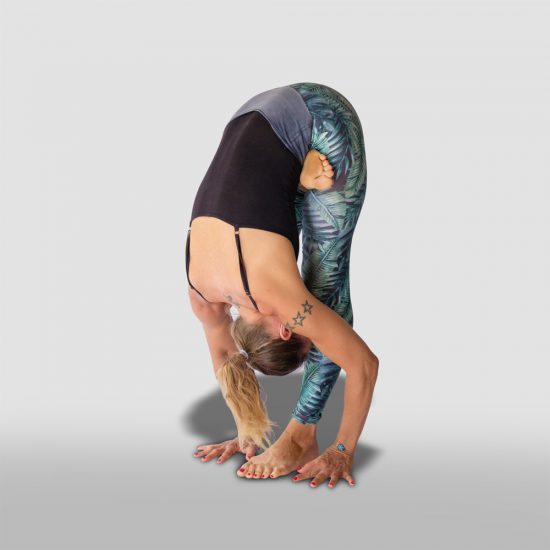
Half Bound Lotus Standing Forward Bend
Sanskrit Name: Ardha Baddha Padmottanasana
forward-bend, advanced, balancingBenefit:
Half Bound Lotus Standing Forward Bend stimulate digestions, improves blood circulation, stretches calves, hamstrings and back, ankle and hip flexibility. Improve the balance.
Keys:
Bottom leg straight, hips at the same level, long spine, body weight forward, palms press.
Cautions:
Blood pressure, knee and hip injuries.
Level:
advanced
Type:
forward-bend
Quality:
balancing
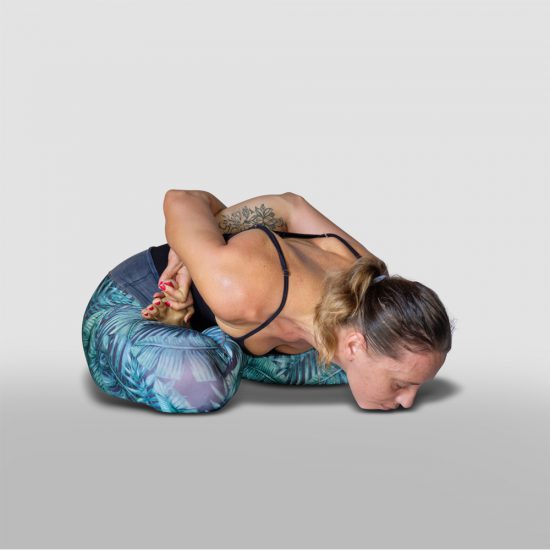
Locked Lotus Pose
Sanskrit Name: Baddha Padmasana
forward-bend, advanced, groundingBenefit:
Locked Lotus Pose relax the nervous system. Stimulate the digestive process. Alleviates shoulder, arm, and back pain. Massages the abdominal organs. Stretch the back muscles.
Keys:
Knees and buttocks on the ground, inner thighs engage, spine long till the top the crown, scapula retraction.
Cautions:
Hips, knee, ankle and shoulder injury, do not strain the neck.
Level:
advanced
Type:
forward-bend
Quality:
grounding
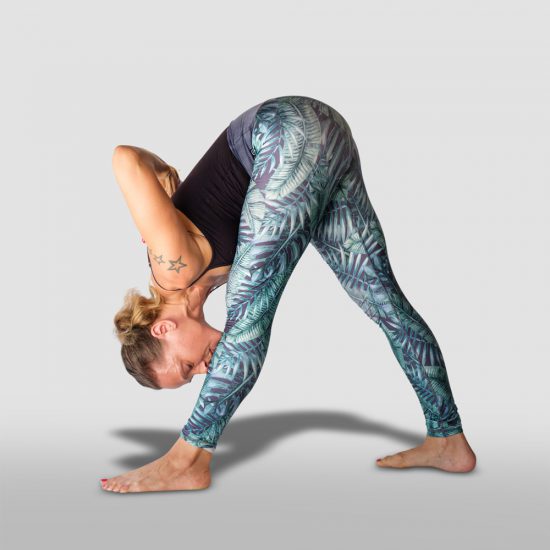
Reverse Prayer Pyramid
Sanskrit Name: Parsvottanasana Paschima Namaskarasana
forward-bend, intermediate, calmingBenefit:
Reverse Prayer Pyramid develops stamina and deeply tones the legs. Improves the flexibility of the hamstrings, wrist, shoulders, hips and spine. Relax the mind and bring balance in your everyday life.
Keys:
Keep the shoulders relaxed, the hips squared, and the elbows pointing outward.
Cautions:
Blood pressure, lower spine injuries, wrists and shoulders injuries.
Level:
intermediate
Type:
forward-bend
Quality:
calming
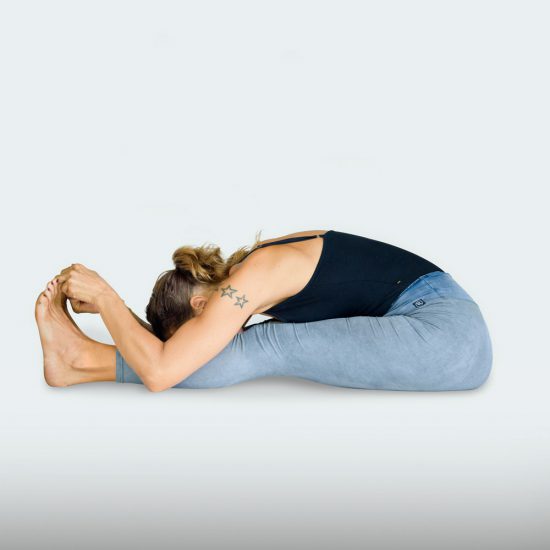
Seated Forward Bend
Sanskrit Name: Paschimottanasana
forward-bend, intermediate, calmingBenefit:
Seated Forward Bend stretches the lower back muscles, calves and hamstrings. Stimulates and tones the abdominal organs. Encourages introspection and calms the nervous system.
Keys:
The elbows should be pointing down, the shoulders and the neck relaxed. Do not round the spine.
Cautions:
Pregnancy, hernia, back or spine injury, sciatica.
Level:
intermediate
Type:
forward-bend
Quality:
calming
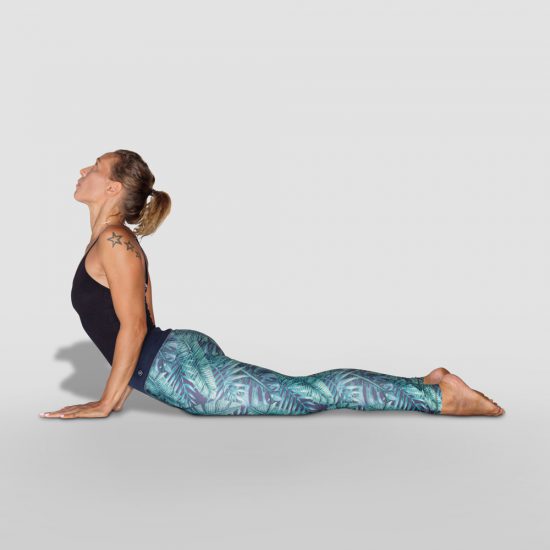
Cobra Pose
Sanskrit Name: Bhujangasana
back-bend, intermediate, energizingBenefit:
Cobra Pose keeps the spine supple and healthy. Strengthen the back and open the chest encouraging a deeper breath. Promote digestion. Back Strength, Chest Opening, Spine Elongation.
Keys:
Legs active, Chest forward then up, Beware of back compression, Hips on the floor, shoulders back and down. Allow to slightly bend the elbows.
Cautions:
Neck, shoulders or spine injuries.
Level:
intermediate
Type:
back-bend
Quality:
energizing
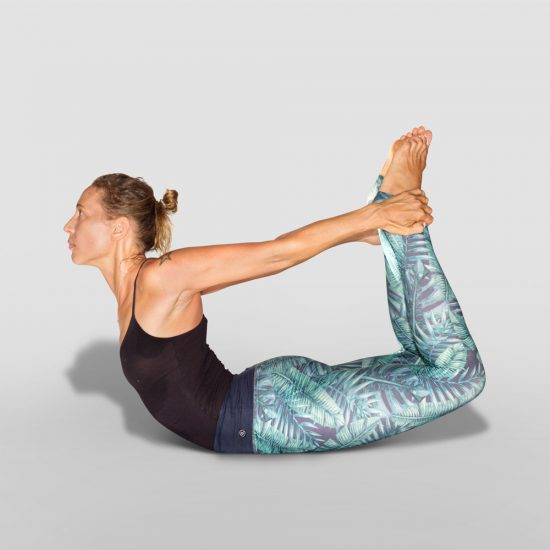
Bow Pose
Sanskrit Name: Dhanurasana
back-bend, intermediate, energizingBenefit:
Bow Pose stretches the spine, neck, shoulders, torso, abdomen and quadriceps while strengthening the core, hamstrings and gluteal muscles. Massage of the abdominal organs. Core, Back Strength, Chest opening, Improving digestion.
Keys:
Cervical spine lengthened, Lift the chest and legs up, Push the ankles against the palms.
Cautions:
Neck, shoulders or back injuries.
Level:
intermediate
Type:
back-bend
Quality:
energizing
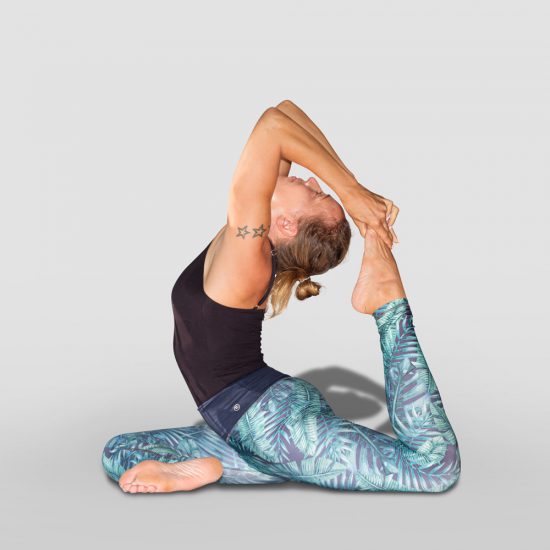
King Pigeon Pose
Sanskrit Name: Eka Pada Rajakapotasana
back-bend, advanced, energizingBenefit:
King Pigeon Pose brings body awareness, opens the chest and improves the posture. Back and core Strengthening, Hips Flexibility.
Keys:
Hips on the floor at the same level, Mind the front knee and lower back, Shoulders and chest opened, back extention.
Cautions:
Neck, back, hips, knees or ankle injuries. Shoulder dislocations.
Level:
advanced
Type:
back-bend
Quality:
energizing
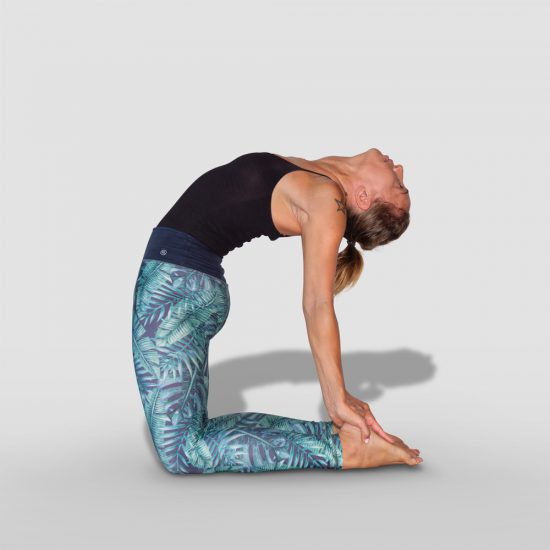
Camel Pose
Sanskrit Name: Ustrasana
back-bend, intermediate, energizingBenefit:
Camel Pose improves breathing and releases tension in the anterior body from the knee to the chin. Improves the digestive and reproductive system. Spine Flexibility, Hip and Chest Opener, Arms and Thighs Strength.
Keys:
Hips directly above knees, Shoulders away from the ears, Chest open, Mind the lower back.
Cautions:
Spine, shoulders or neck injuries. Blood pressure.
Level:
intermediate
Type:
back-bend
Quality:
energizing
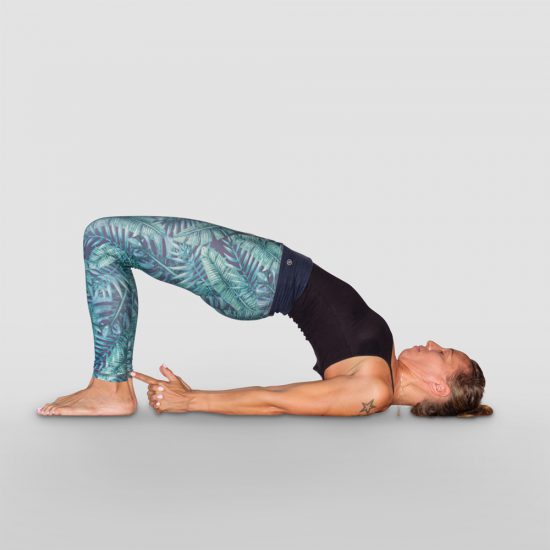
Bridge Pose
Sanskrit Name: Sethu Bandha Sarvangasana
back-bend, beginner, calmingBenefit:
Bridge Pose relieves back pain, improves blood circulation, and calms the mind and the nervous system. Back, Legs, and Shoulders Strength, Chest Opener, Spine Flexibility.
Keys:
Feet press, Knees directly above the ankles, Lift from the hips, chest toward the chin, arms support and scapula toward each other. Mind the neck.
Cautions:
Any neck, shoulders or back injuries.
Level:
beginner
Type:
back-bend
Quality:
calming
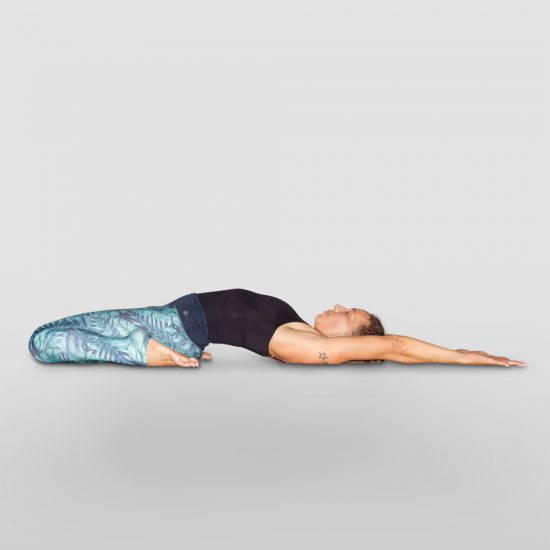
Reclined Hero Pose
Sanskrit Name: Supta Virasana
back-bend, intermediate, calmingBenefit:
Reclined Hero Pose stretches the ankles and quadriceps intensely. Good chest opening and relaxation pose. Abdomen stretching, Rejuvenating knees, Posture improving.
Keys:
Hips rest between the feet, Knees and shoulders rest on the mat, Chest expansion, arms along the ears. Extend one leg if you feel discomfort in the knees.
Cautions:
Knees, neck or lower back injury.
Level:
intermediate
Type:
back-bend
Quality:
calming
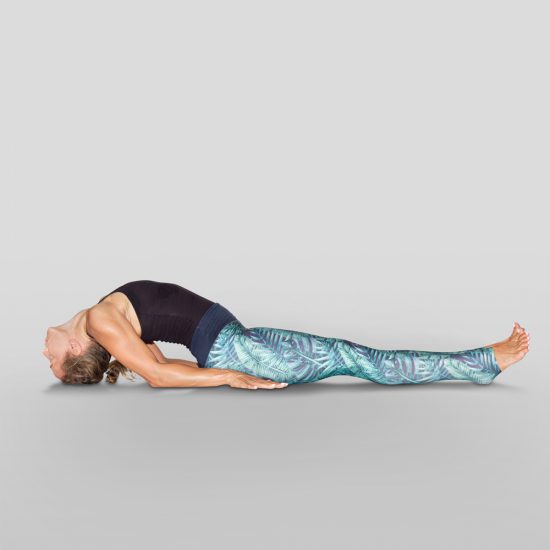
Fish Pose
Sanskrit Name: Matsyasana
back-bend, intermediate, calmingBenefit:
Matsyasana opens the shoulders and chest and improve lung capacity. Release muscular tension in neck and shoulders. Usually use as a counter pose for Sarvangasana. Chest opening, Spine lengthening, Back strengthening.
Keys:
Legs and feet actives, Hips pressed on the floor, chest lifting up, scapula toward each other, top of the head on the floor, elbows bend. Mind the neck.
Cautions:
Neck injuries, migraines, blood pressure.
Level:
intermediate
Type:
back-bend
Quality:
calming
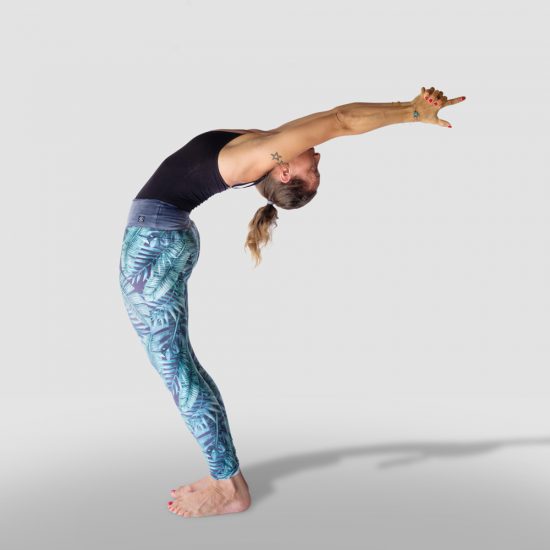
Raised Arm Pose
Sanskrit Name: Hasta Uttanasana
back-bend, intermediate, energizingBenefit:
Raised Arm Pose strengthens the back muscles, improves the flexibility of the spine and opens the heart.
Keys:
Shoulders wide apart, chest expand, gaze at fingertips, hips forward, legs zipped, feet together pressing firmly on the floor. Use the breath properly to do not compress the lower back, do not strain the shoulders and the back of the neck.
Cautions:
Neck, shoulders or spine injury. Blood pressure or lack of balance.
Level:
intermediate
Type:
back-bend
Quality:
energizing
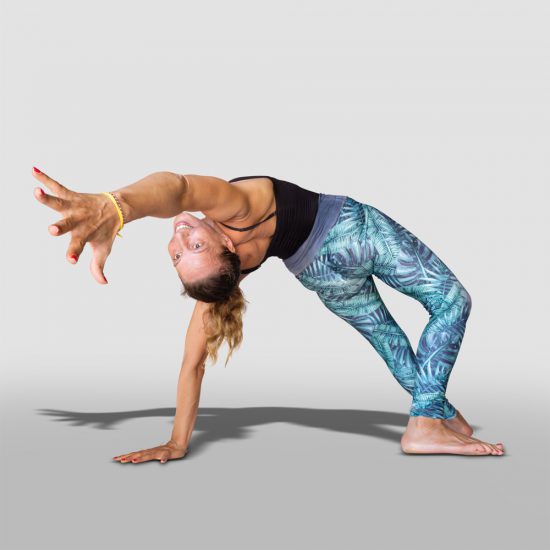
Wild Thing Pose
Sanskrit Name: Camatkarasana
back-bend, intermediate, energizingBenefit:
Wild Thing Pose opens the chest, stretch hip flexor and psoas. Strengthen shoulders and upper back muscles.
Keys:
Bottom arms wrist and shoulder in a line, feet press, buttock muscle engage, hips pushing up, extended arm back tower the floor , gaze the thumb.
Cautions:
Mind the lower back compression. Ankles, wrist, elbows, shoulders or neck injuries. Blood pressure.
Level:
intermediate
Type:
back-bend
Quality:
energizing
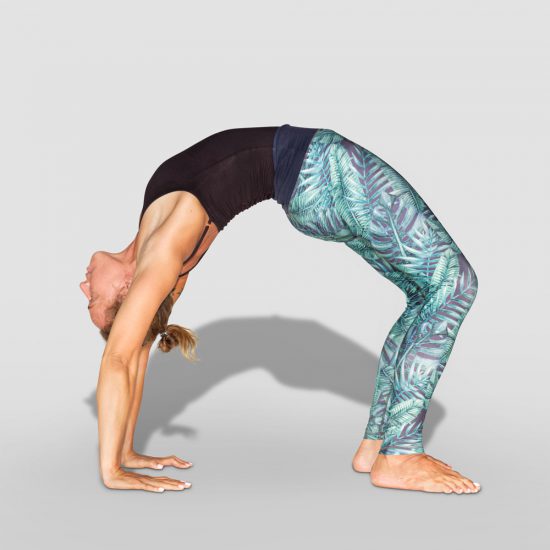
Wheel Pose
Sanskrit Name: Urdhva Dhanurasana
back-bend, advanced, energizingBenefit:
Wheel Pose develops and tones all the body muscles. Stretches and lengthens the spine. Beneficial for depression. Improves confidence and boosts energy.
Keys:
The pubis should be lifted upward, the palms and feet firmly pressing and pushing the floor away, and the chest open.
Cautions:
Wrist, elbows, shoulders or spine injury.
Level:
advanced
Type:
back-bend
Quality:
energizing
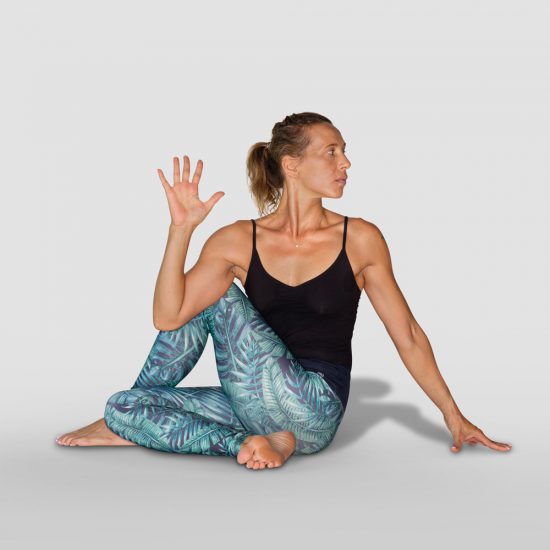
Half Spinal Twist
Sanskrit Name: Ardha Matsyendrasana
twist pose, beginner, calmingBenefit:
Half Spinal Twist tones the spinal nerve and improves blood circulation also massages the abdominal organs. Chest, Hips and Lower Back Stretch, Chest Opening, Circulation.
Keys:
Press the sit bones, Spine elongated, Thigh press on the chest, Relax the shoulders, Gaze back.
Cautions:
Hernia, spine injuries or irritable bowel syndrome.
Level:
beginner
Type:
twist pose
Quality:
calming
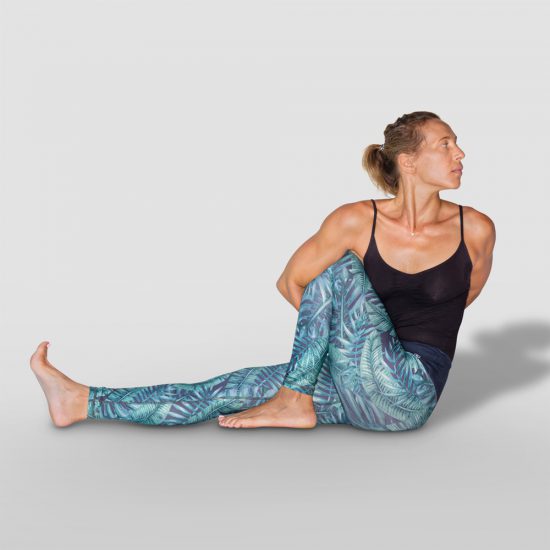
Sage Marichi 3
Sanskrit Name: Marichyasana III
twist pose, intermediate, calmingBenefit:
Sage Marichi 3 increase the mobility of the spine, stretches the intercostal muscles. Massage of abdominal organs especially liver and kidney. Relieves back and hip pain. Shoulders and hips opening, Spine Elongation.
Keys:
Extended leg active and foot flexed, Spine elongated, arms active and squeezing the bent leg, Gaze over your shoulder, Do not lean back
Cautions:
Migraine, insomnia, serious back injuries.
Level:
intermediate
Type:
twist pose
Quality:
calming
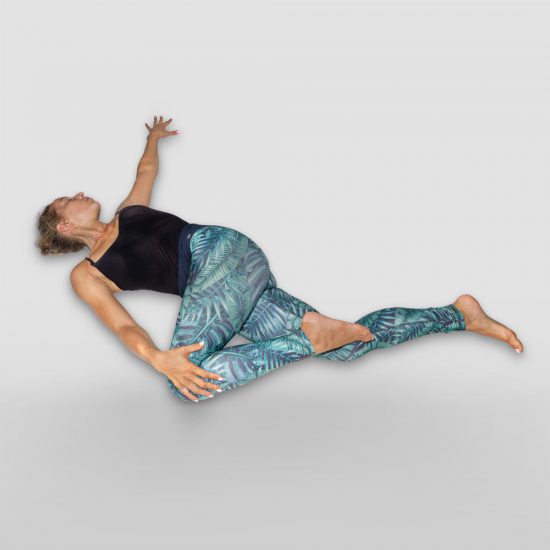
Supine Spinal Twist
Sanskrit Name: Supta Matsyendrasana
twist pose, beginner, calmingBenefit:
Supine Spinal Twist massages and tones the abdominal organs and muscles.Relaxing the spine. Stretches the obliques, glutes and chest. Spine and Shoulder Stretching, Relaxing, Improving Digestion.
Keys:
Hip stacked on the top of the other, Lower back awareness, Mind the breath, Shoulders on the floor, arms in one line, do not forceful to put the knee on the floor.
Cautions:
cervical (neck) and lumbar (lower back) issues.
Level:
beginner
Type:
twist pose
Quality:
calming
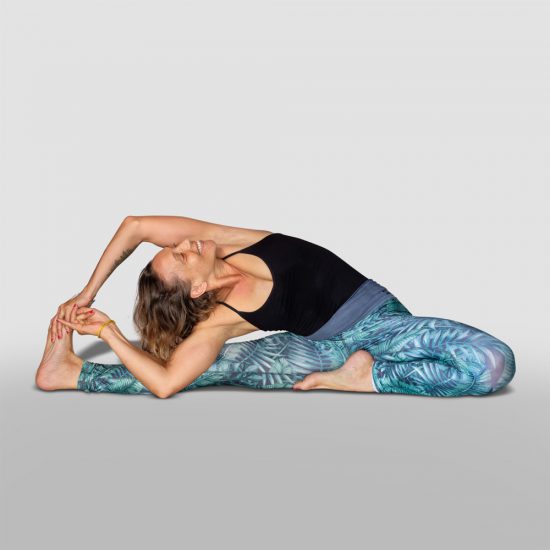
Revolved Head To Knee Pose
Sanskrit Name: Parivrtta Janu Sirsasana
twist pose, intermediate, calmingBenefit:
Revolved Head To Knee Pose brings lateral stretch, hamstring, abdomen muscles, and organs compression. Prepare for extended periods in meditation pose or splits.
Keys:
Both hips on the floor, legs active and pressing down, chest facing up, side of the body long, gaze up, arms pulling the flexed foot. Use the breath correctly to help the elongation of the upper side of the body and don't pinch the lower part of the chest on your waist.
Cautions:
Hernia, spine injuries, irritable bowel syndrome and hamstring injuries.
Level:
intermediate
Type:
twist pose
Quality:
calming
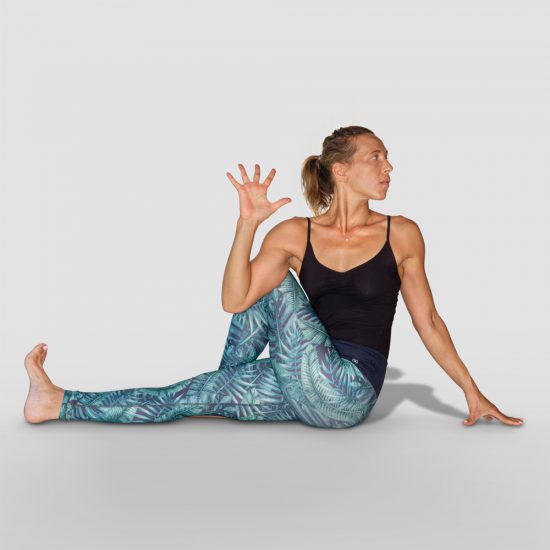
Lord Of The Fishes
Sanskrit Name: Matsyendrasana
twist pose, beginner, calmingBenefit:
Lord Of The Fishes tones the spinal nerves and improves the range of motion of the spine. Stimulate and tones the abdominal organs. Improves respiratory breathing capacity.
Keys:
The twist should be engaged from the thoracic spine, and the hips facing the front of the mat.
Cautions:
Migraine, high blood pressure, ankle, hips, knee, shoulders or neck injuries.
Level:
beginner
Type:
twist pose
Quality:
calming
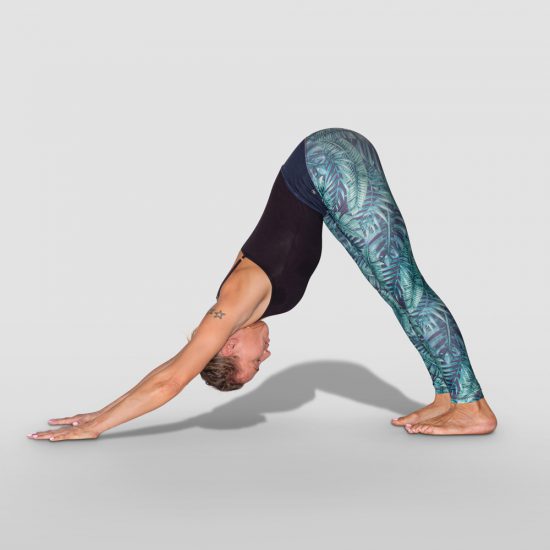
Downward Facing Dog
Sanskrit Name: Adho Mukha Svanasana
inversion pose, beginner, groundingBenefit:
Downward Facing Dog creates extension of the entire spine. Calm the nervous system. This pose easily fit into any sequence as it is both a resting pose and a great transition pose. All-over Stretch, Arms, Leg, Core Strength, Improves Digestions.
Keys:
Palms actively pressing on the mat, Keep a natural spine alignment, Rotate the shoulders outward, hips up, knee cap pull, feet parallel, heels slightly opened out.
Cautions:
High blood pressure.
Level:
beginner
Type:
inversion pose
Quality:
grounding
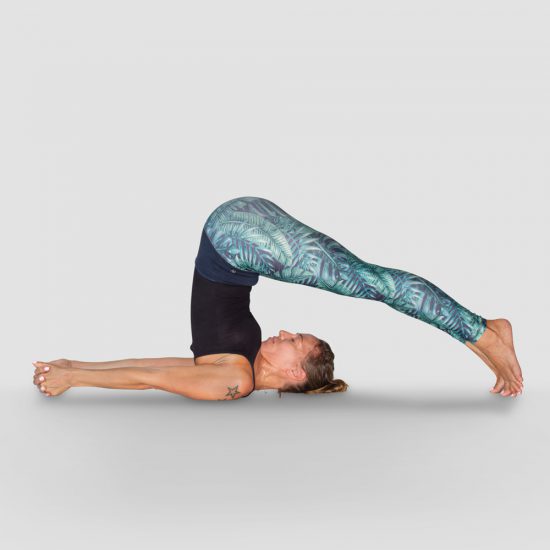
Plow Pose
Sanskrit Name: Halasana
inversion pose, intermediate, calmingBenefit:
Plow Pose improves the blood circulation to the heart lungs and brain and stimulates the reproductive organs. Regulate the activities of the thyroid gland. Abdominal muscles Strength, Stretches the back and the hamstring.
Keys:
Hips and shoulders in a same line, Cores engaged, Arms and shoulders support, Mind the neck.
Cautions:
Neck, shoulder injuries, scoliosis, glaucoma, high blood pressure.
Level:
intermediate
Type:
inversion pose
Quality:
calming
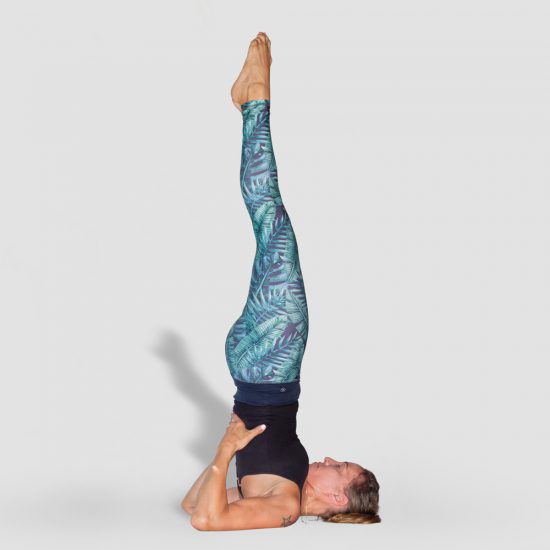
Shoulder Stand
Sanskrit Name: Sarvangasana
inversion pose, intermediate, calmingBenefit:
Shoulder Stand improves body awareness, blood circulation to the brain and helps realigning the vertebras. Tranquilize the mind and relieve stress. Stimulates the thyroid gland. Generally balance nervous, reproductive, endocrine, respiratory, circulatory and digestive systems. Spine, Neck, Shoulder Stretching, Core and Legs Strengthening, Metabolism Regulating.
Keys:
Chin on the throat, Lift the legs up to lighten the pose, Pelvis above shoulder heels above hips, elbows in line with the shoulders. Mind the neck.
Cautions:
Neck, shoulder injuries, glaucoma, high blood pressure.
Level:
intermediate
Type:
inversion pose
Quality:
calming
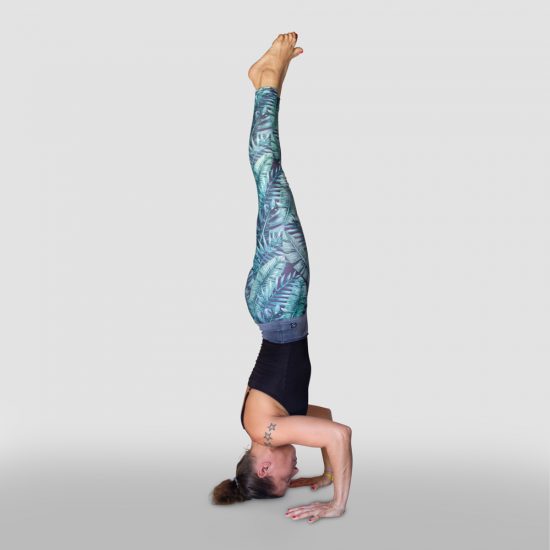
Headstand Pose
Sanskrit Name: Sirsasana
inversion pose, advanced, energizingBenefit:
Headstand Pose strengthen the arms, shoulders, back muscles, legs. Stimulate heart and diaphragm. Build awareness, decompress the spine, stimulate the crown chakra.
Keys:
Same cues as Salamba Sirsasana, in addition, use the palms here to push the floor away and lighten the weight on the cervical. Keep the elbows above the wrists. Mind the cervical. Use the wall if needed till you find enough strength and balance. Preferably learn the pose with a competent teacher.
Cautions:
Neck and back injuries, blood pressure, headaches.
Level:
advanced
Type:
inversion pose
Quality:
energizing
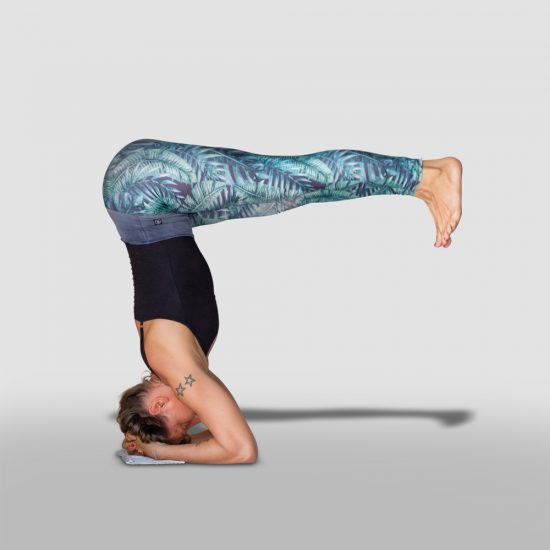
Half Headstand Pose
Sanskrit Name: Urdhva Dandasana
inversion pose, advanced, balancingBenefit:
Half Headstand Pose strengthen the arms, shoulders, back muscles, legs. Stimulates heart and diaphragm. Build awareness, decompress the spine, stimulate the crown chakra.
Keys:
Use the lower arms and shoulder muscles to push the floor away, hips above shoulders, heels in line with hips, cores and inner thighs engaged. Use a wall if necessary until you find enough strength and balance. Preferably learn the pose with a competent teacher.
Cautions:
Mind the cervical, neck, shoulders, wrists, elbows or spine injuries.
Level:
advanced
Type:
inversion pose
Quality:
balancing
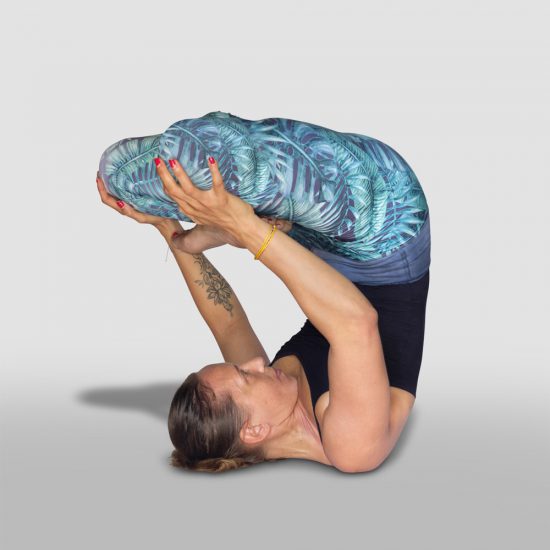
Lotus Shoulderstand Pose
Sanskrit Name: Padma Sarvangasana
inversion pose, advanced, calmingBenefit:
Lotus Shoulderstand Pose stretches the spine, neck and shoulders. Core and Legs Strengthening. Metabolism Regulating. Balance improvement. Lower abdomen internal organ massage.
Keys:
Lift up from the shoulders to the tip of the tailbone to lighten the pose and the chest compression. Pelvis above shoulder heels above hips. Back of the neck long.
Cautions:
High blood pressure, ankle, hip, knee, shoulders or neck injuries.
Level:
advanced
Type:
inversion pose
Quality:
calming
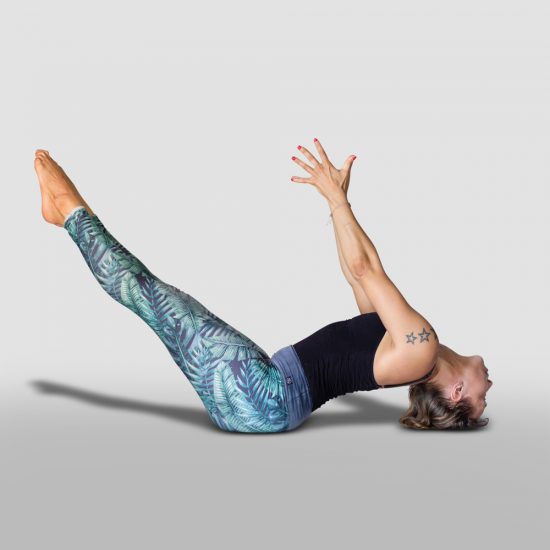
Super Fish Pose
Sanskrit Name: Matsyasana variation
inversion pose, intermediate, energizingBenefit:
Super Fish Pose opens the chest and stretches the neck and spine. Strengthen quadriceps, gluteus maximus, cores, and back muscles. Stimulate the abdomen internal organs, cranial and thyroid gland.
Keys:
Top the head gently, rest on the floor, chest up, spine arch, hips the on floor, legs and arms up and squeezed.
Cautions:
Avoid neck compression. Spine or cervical injuries. People with high blood pressure may feel dizzy.
Level:
intermediate
Type:
inversion pose
Quality:
energizing
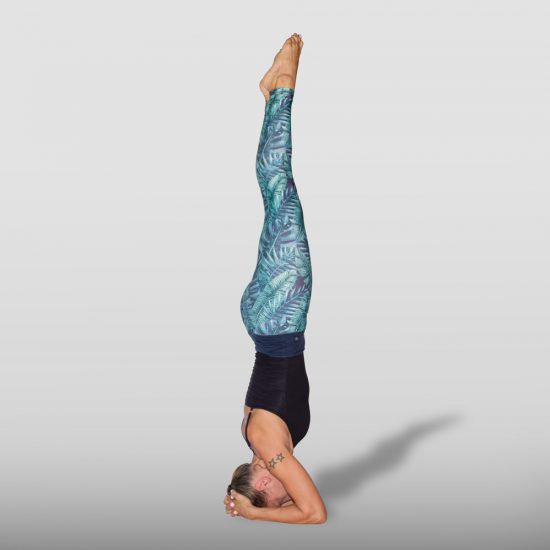
Supported Headstand Pose
Sanskrit Name: Salamba Sirsasana
inversion pose, intermediate, energizingBenefit:
Supported Headstand Pose provides strength to the entire body. Relieves all body organs. Increases the blood circulation and tone the Pituitary gland. Improves the balance and awareness.
Keys:
Heels, hips and shoulders should be vertically aligned, the tailbone tucked in. Push the floor away. Use the lower arms and shoulders to reduce the weight on the neck.
Cautions:
Neck and back injuries, blood pressure, headaches.
Level:
intermediate
Type:
inversion pose
Quality:
energizing
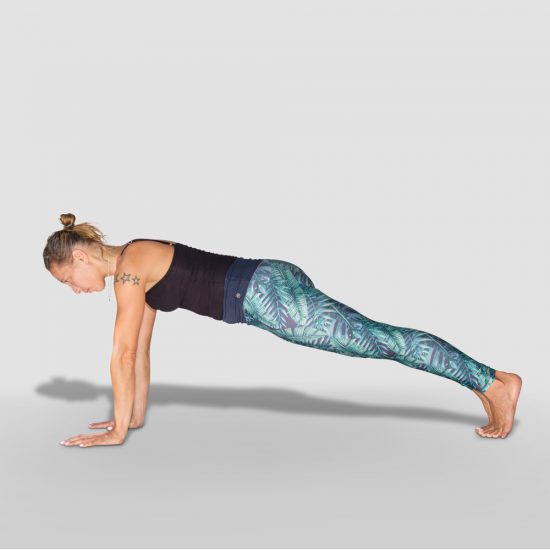
Plank Pose
Sanskrit Name: Kumbhakasana
arm-balance pose, beginner, balancingBenefit:
Plank Pose helps remaining focused and improves concentration, without which maintaining this pose is not possible. Tone the cores, legs, shoulders and arms. Overall Muscle, Toning and Strengthening, Improves the posture.
Keys:
Legs and core engaged, Heels, hips and shoulders in a line, Shoulder blades spread apart. Elongate the back of the neck. Do not let the hips collapses.
Cautions:
Wrists, elbows or shoulder injuries.
Level:
beginner
Type:
arm-balance pose
Quality:
balancing
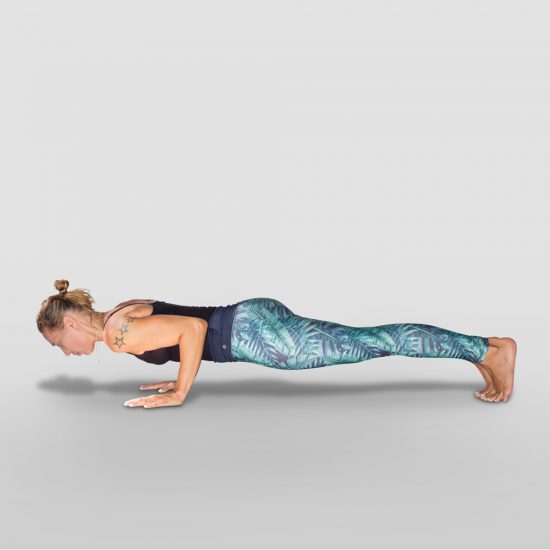
Four-Limbed Staff Pose
Sanskrit Name: Chaturanga Dandasana
arm-balance pose, intermediate, balancingBenefit:
Chaturanga helps remaining focused and improves concentration. Help to understand and control the movements of the scapulas. Arms, Wrists, shoulders and Spine Strength, Strengthens and tone the core.
Keys:
Legs and core engaged, Don't collapse on the shoulders and hips, shoulders in line with elbows, Heels, hips, shoulders and neck in one line.
Cautions:
Wrist, elbow or shoulders injuries.
Level:
intermediate
Type:
arm-balance pose
Quality:
balancing
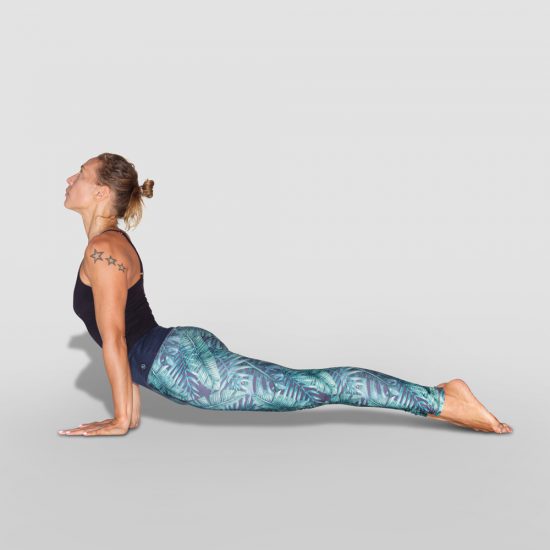
Upward Facing Dog
Sanskrit Name: Urdhva Mukha Svanasana
arm-balance pose, beginner, energizingBenefit:
Upward Facing Dog promotes proper deep breathing, improve lung capacity and blood circulation around the body. Tone the cores, strengthen the arms, thighs and glutes. Back and Shoulder Strength, Chest Opening.
Keys:
Legs actives and hips off the floor, Elongate the spine, Core engaged, Chest open, Shoulders back in line with the wrists.
Cautions:
Ankles, wrist, elbows, neck, spine or shoulders injuries. Winged scapula.
Level:
beginner
Type:
arm-balance pose
Quality:
energizing
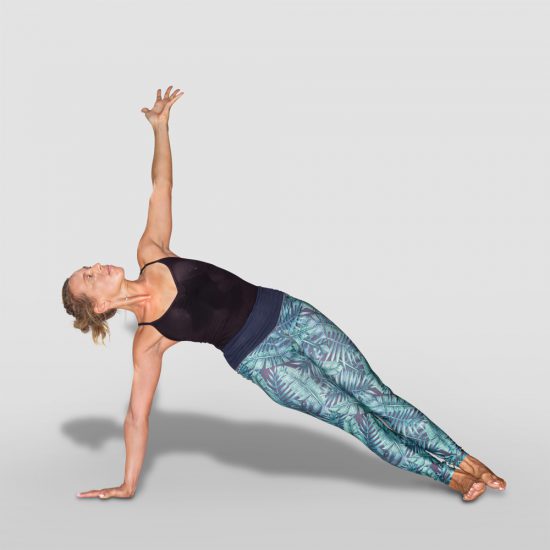
Side Plank Pose
Sanskrit Name: Vasisthasana
arm-balance pose, beginner, balancingBenefit:
Side Plank Pose is an excellent preparatory pose for arm balances as it works on the wrists, arms shoulders, core, pelvic floor and balance. Balance, Overall Body Strength, Concentration.
Keys:
Core engaged, Hips lifting up and above each other. Arms in a same line, Maintain balance, Mind the neck.
Cautions:
Wrists, elbows or shoulder injuries.
Level:
beginner
Type:
arm-balance pose
Quality:
balancing
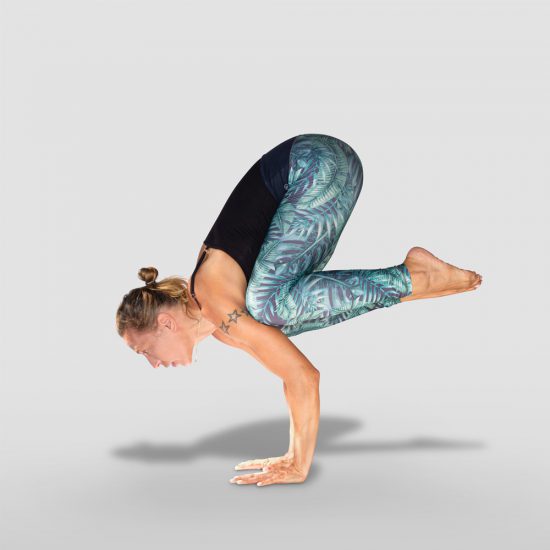
Crane Pose
Sanskrit Name: Bakasana
arm-balance pose, intermediate, balancingBenefit:
Crane Pose strengthens the arms, wrists, elbows, shoulders and tone the abdominal muscles. Improves concentration, balance and promote confidence.
Keys:
Look slightly forward, knees under the armpits, body weight forward and up, tailbone upward, cores engage, elbows above wrists. Avoid to press the knees on the elbows.
Cautions:
Wrists, elbows or shoulder injuries.
Level:
intermediate
Type:
arm-balance pose
Quality:
balancing
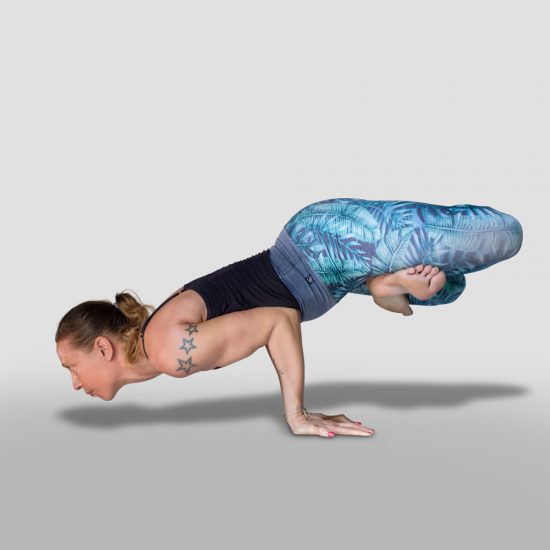
Lotus Peacock Pose
Sanskrit Name: Padma Mayurasana
arm-balance pose, advanced, balancingBenefit:
Lotus Peacock Pose strengthens arm, shoulder and back muscles. Improve balance, focus, digestion and relieve constipation.
Keys:
Finger pointing backward, elbows pressing on the lower abdomen, shoulder, hip and knees on one line, gaze forward.
Cautions:
Ankle, knees, hips injuries. Avoid during pregnancy or with high blood pressure.
Level:
advanced
Type:
arm-balance pose
Quality:
balancing
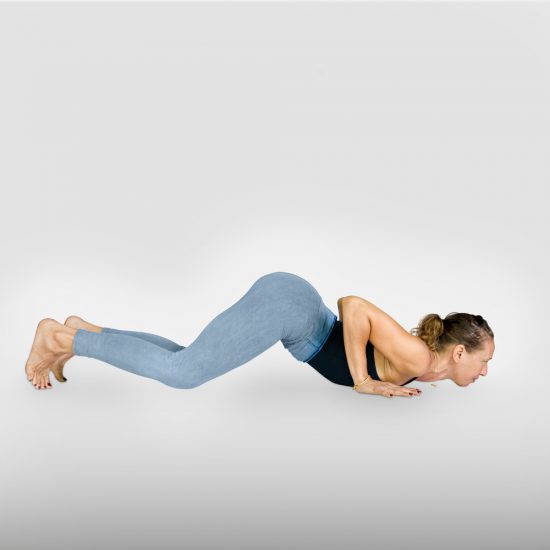
Eight Limbed Salutation
Sanskrit Name: Ashtanga namaskara
arm-balance pose, intermediate, balancingBenefit:
Eight Limbed Salutation provides overall stretching and strength to muscles and joints. Improves stability, flexibility and mobility of the back and spine. Helps to build stability of the mind and confidence.
Keys:
Mind spine and shoulders compression and keep the elbows close to the chest. The bra line should be past the thumbs.
Cautions:
Herniated discs, lower back pain, arthritis, migraine, pregnancy.
Level:
intermediate
Type:
arm-balance pose
Quality:
balancing
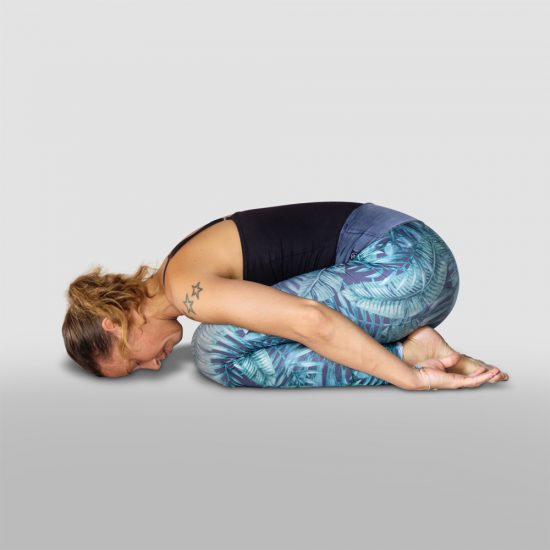
Child Pose
Sanskrit Name: Balasana
restorative pose, beginner, calmingBenefit:
Child Pose massages the abdominal internal organs, gently stretches the spine hips and thighs, calms the nervous system and relieves tiredness.
Keys:
Big toes together, sitting on the hills, knees open, spine round, belly between thighs, forehead on the floor, shoulder relaxed.
Cautions:
Hip, ankle or knee injury, do not strain the neck.
Level:
beginner
Type:
restorative pose
Quality:
calming
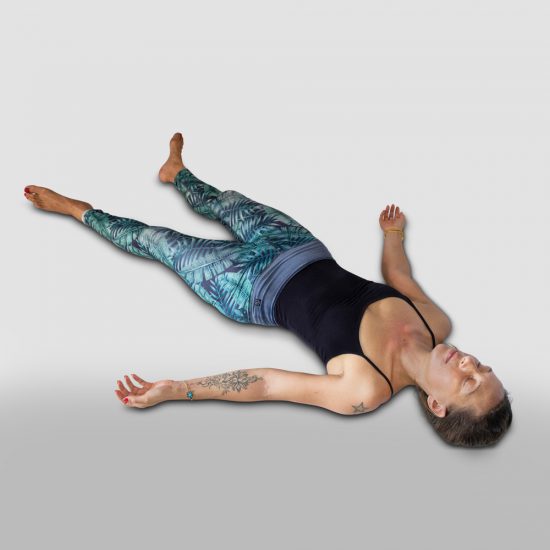
Corpse Pose
Sanskrit Name: Shavasana
restorative pose, beginner, calmingBenefit:
Corpse Pose relaxes the psychophysiological system. Develop body awareness leading to pratyahara, allow the body to rest and to integrate all the benefits of the asanas.
Keys:
Feet slightly apart hands about 15cm from the hips. Whole body relaxed, palms facing up, eyes closed.
Cautions:
For lower back or hips issues use a pillow under the knees.
Level:
beginner
Type:
restorative pose
Quality:
calming
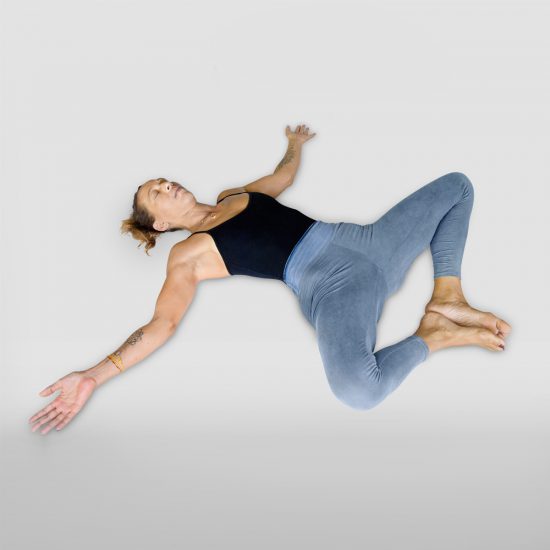
Reclining Bound Angle Pose
Sanskrit Name: Supta Baddha konasana
restorative pose, beginner, calmingBenefit:
Reclining Bound Angle Pose relaxes, calms and restores the entire body. Stretches and expands the inner thighs and groin. Alleviates menstrual pain.
Keys:
The whole body should be relaxed, let gravity work for you. The knees do not need to touch the ground.
Cautions:
Lower back pain. Knees or hips injuries.
Level:
beginner
Type:
restorative pose
Quality:
calming
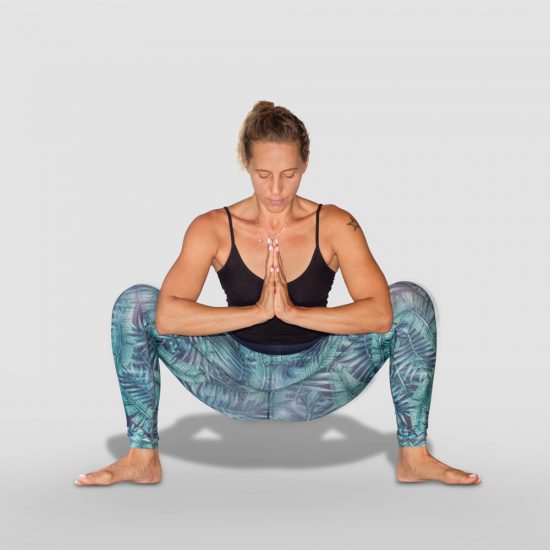
Garland Pose
Sanskrit Name: Malasana
preparatory pose, beginner, calmingBenefit:
Garland Pose trengthens the knees and hips. Build flexibility to the muscles of the back. Hips, shoulders and chest opener. Supports the reproductive system and helps in relieving menstruation pain.
Keys:
Keep the spine elongated, the shoulders open, and the tailbone pointing down.
Cautions:
Ankles, knee or hips injuries. Weak lower back.
Level:
beginner
Type:
preparatory pose
Quality:
calming
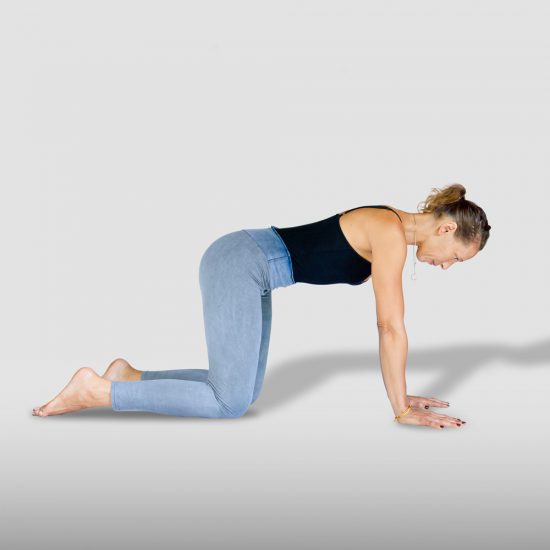
Table Pose
Sanskrit Name: Bharmanasana
preparatory pose, beginner, groundingBenefit:
Table Pose gently stretches and warms up all the muscles and joints of the body. Improves the posture and the body awareness. Balances, prepares the body and mind. Relieve the tensions.
Keys:
Knees and shoulders directly above ankles and wrists respectively, knees, hips and shoulders aligned. Spine elongated.
Cautions:
Wrist or shoulder injuries.
Level:
beginner
Type:
preparatory pose
Quality:
grounding
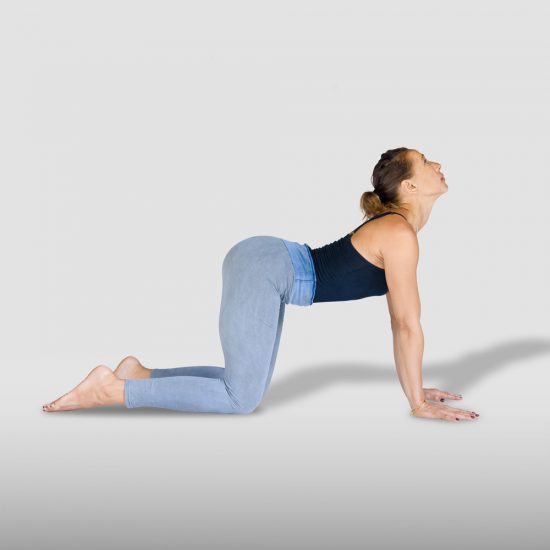
Cow Pose
Sanskrit Name: Bitilasana
preparatory pose, beginner, groundingBenefit:
Cow Pose gently stretches and warms up the spine, hips, shoulders and neck. Especially the front body. Improves mobility and stability of the body joints. Awakes the body and develops awareness.
Keys:
Pull the shoulders away from the ears, mind spine compression, stay grounded, and keep the body weight centered.
Cautions:
Wrist, shoulders, neck or back injuries.
Level:
beginner
Type:
preparatory pose
Quality:
grounding
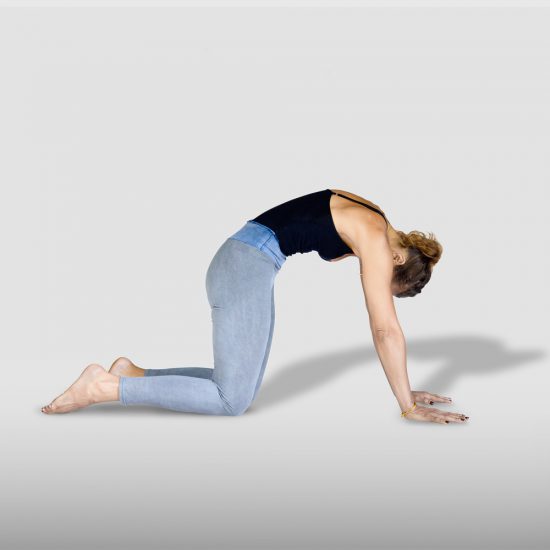
Cat Pose
Sanskrit Name: Marjariasana
preparatory pose, beginner, groundingBenefit:
Cat Pose gently stretches and warm up the spine, hips, shoulders and neck. Especially the back body. Improves mobility and stability of the body joints. Awakens the body and mind awareness. Stimulate the abdominal organs.
Keys:
Pull the shoulder blades away from each other. Push the floor away with your hands and knees, and keep your body weight centered. Spine rounded.
Cautions:
Wrist, shoulders or neck injuries.
Level:
beginner
Type:
preparatory pose
Quality:
grounding
